Supporting people living with dementia - Effective Communication and Person Centred Approach
VerifiedAdded on 2023/06/18
|25
|9077
|270
AI Summary
This assessment consists of six (6) parts. It covers effective communication strategies and person centred approach in care for people living with dementia. The assessment includes scenarios and questions related to verbal and non-verbal communication, providing activities to support maintenance of dignity, skills and health, identification of and responses to changes in client behaviours associated with dementia, evaluating strategies employed to minimise the effects of behaviours, and self-care when working with clients and their families.
Contribute Materials
Your contribution can guide someone’s learning journey. Share your
documents today.
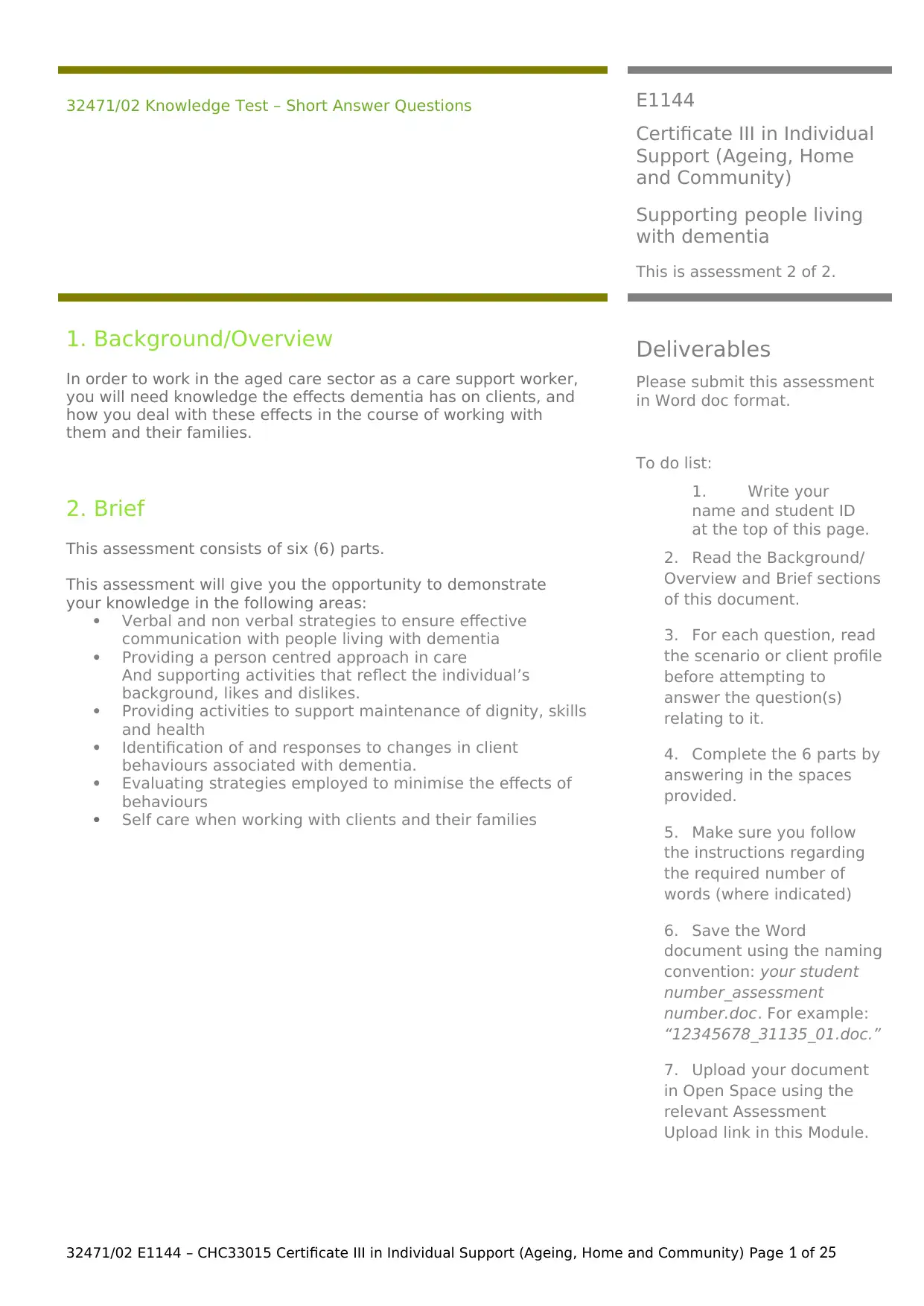
32471/02 Knowledge Test – Short Answer Questions E1144
Certificate III in Individual
Support (Ageing, Home
and Community)
Supporting people living
with dementia
This is assessment 2 of 2.
1. Background/Overview
In order to work in the aged care sector as a care support worker,
you will need knowledge the effects dementia has on clients, and
how you deal with these effects in the course of working with
them and their families.
2. Brief
This assessment consists of six (6) parts.
This assessment will give you the opportunity to demonstrate
your knowledge in the following areas:
Verbal and non verbal strategies to ensure effective
communication with people living with dementia
Providing a person centred approach in care
And supporting activities that reflect the individual’s
background, likes and dislikes.
Providing activities to support maintenance of dignity, skills
and health
Identification of and responses to changes in client
behaviours associated with dementia.
Evaluating strategies employed to minimise the effects of
behaviours
Self care when working with clients and their families
Deliverables
Please submit this assessment
in Word doc format.
To do list:
1. Write your
name and student ID
at the top of this page.
2. Read the Background/
Overview and Brief sections
of this document.
3. For each question, read
the scenario or client profile
before attempting to
answer the question(s)
relating to it.
4. Complete the 6 parts by
answering in the spaces
provided.
5. Make sure you follow
the instructions regarding
the required number of
words (where indicated)
6. Save the Word
document using the naming
convention: your student
number_assessment
number.doc. For example:
“12345678_31135_01.doc.”
7. Upload your document
in Open Space using the
relevant Assessment
Upload link in this Module.
32471/02 E1144 – CHC33015 Certificate III in Individual Support (Ageing, Home and Community) Page 1 of 25
Certificate III in Individual
Support (Ageing, Home
and Community)
Supporting people living
with dementia
This is assessment 2 of 2.
1. Background/Overview
In order to work in the aged care sector as a care support worker,
you will need knowledge the effects dementia has on clients, and
how you deal with these effects in the course of working with
them and their families.
2. Brief
This assessment consists of six (6) parts.
This assessment will give you the opportunity to demonstrate
your knowledge in the following areas:
Verbal and non verbal strategies to ensure effective
communication with people living with dementia
Providing a person centred approach in care
And supporting activities that reflect the individual’s
background, likes and dislikes.
Providing activities to support maintenance of dignity, skills
and health
Identification of and responses to changes in client
behaviours associated with dementia.
Evaluating strategies employed to minimise the effects of
behaviours
Self care when working with clients and their families
Deliverables
Please submit this assessment
in Word doc format.
To do list:
1. Write your
name and student ID
at the top of this page.
2. Read the Background/
Overview and Brief sections
of this document.
3. For each question, read
the scenario or client profile
before attempting to
answer the question(s)
relating to it.
4. Complete the 6 parts by
answering in the spaces
provided.
5. Make sure you follow
the instructions regarding
the required number of
words (where indicated)
6. Save the Word
document using the naming
convention: your student
number_assessment
number.doc. For example:
“12345678_31135_01.doc.”
7. Upload your document
in Open Space using the
relevant Assessment
Upload link in this Module.
32471/02 E1144 – CHC33015 Certificate III in Individual Support (Ageing, Home and Community) Page 1 of 25
Secure Best Marks with AI Grader
Need help grading? Try our AI Grader for instant feedback on your assignments.
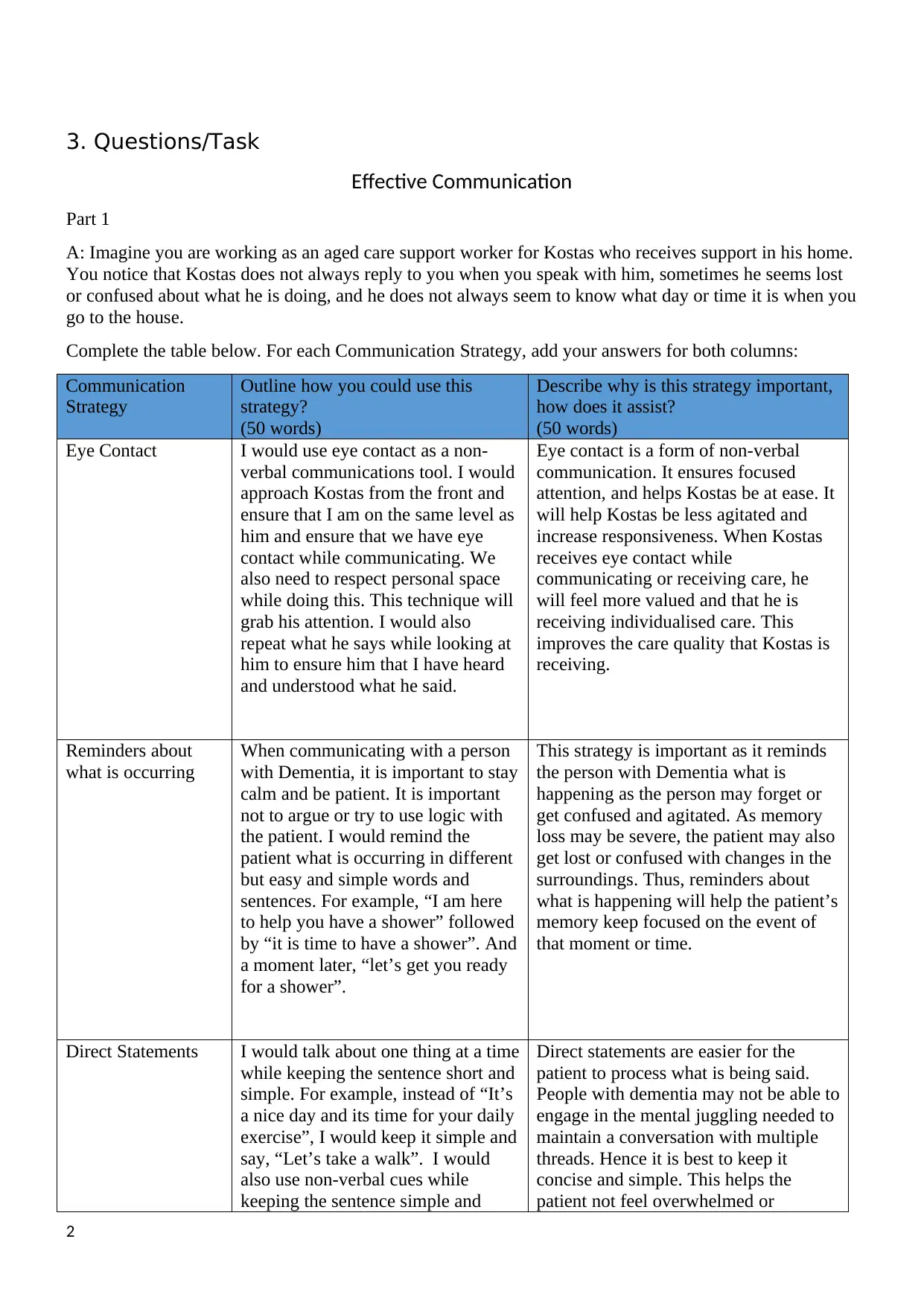
3. Questions/Task
Effective Communication
Part 1
A: Imagine you are working as an aged care support worker for Kostas who receives support in his home.
You notice that Kostas does not always reply to you when you speak with him, sometimes he seems lost
or confused about what he is doing, and he does not always seem to know what day or time it is when you
go to the house.
Complete the table below. For each Communication Strategy, add your answers for both columns:
Communication
Strategy
Outline how you could use this
strategy?
(50 words)
Describe why is this strategy important,
how does it assist?
(50 words)
Eye Contact I would use eye contact as a non-
verbal communications tool. I would
approach Kostas from the front and
ensure that I am on the same level as
him and ensure that we have eye
contact while communicating. We
also need to respect personal space
while doing this. This technique will
grab his attention. I would also
repeat what he says while looking at
him to ensure him that I have heard
and understood what he said.
Eye contact is a form of non-verbal
communication. It ensures focused
attention, and helps Kostas be at ease. It
will help Kostas be less agitated and
increase responsiveness. When Kostas
receives eye contact while
communicating or receiving care, he
will feel more valued and that he is
receiving individualised care. This
improves the care quality that Kostas is
receiving.
Reminders about
what is occurring
When communicating with a person
with Dementia, it is important to stay
calm and be patient. It is important
not to argue or try to use logic with
the patient. I would remind the
patient what is occurring in different
but easy and simple words and
sentences. For example, “I am here
to help you have a shower” followed
by “it is time to have a shower”. And
a moment later, “let’s get you ready
for a shower”.
This strategy is important as it reminds
the person with Dementia what is
happening as the person may forget or
get confused and agitated. As memory
loss may be severe, the patient may also
get lost or confused with changes in the
surroundings. Thus, reminders about
what is happening will help the patient’s
memory keep focused on the event of
that moment or time.
Direct Statements I would talk about one thing at a time
while keeping the sentence short and
simple. For example, instead of “It’s
a nice day and its time for your daily
exercise”, I would keep it simple and
say, “Let’s take a walk”. I would
also use non-verbal cues while
keeping the sentence simple and
Direct statements are easier for the
patient to process what is being said.
People with dementia may not be able to
engage in the mental juggling needed to
maintain a conversation with multiple
threads. Hence it is best to keep it
concise and simple. This helps the
patient not feel overwhelmed or
2
Effective Communication
Part 1
A: Imagine you are working as an aged care support worker for Kostas who receives support in his home.
You notice that Kostas does not always reply to you when you speak with him, sometimes he seems lost
or confused about what he is doing, and he does not always seem to know what day or time it is when you
go to the house.
Complete the table below. For each Communication Strategy, add your answers for both columns:
Communication
Strategy
Outline how you could use this
strategy?
(50 words)
Describe why is this strategy important,
how does it assist?
(50 words)
Eye Contact I would use eye contact as a non-
verbal communications tool. I would
approach Kostas from the front and
ensure that I am on the same level as
him and ensure that we have eye
contact while communicating. We
also need to respect personal space
while doing this. This technique will
grab his attention. I would also
repeat what he says while looking at
him to ensure him that I have heard
and understood what he said.
Eye contact is a form of non-verbal
communication. It ensures focused
attention, and helps Kostas be at ease. It
will help Kostas be less agitated and
increase responsiveness. When Kostas
receives eye contact while
communicating or receiving care, he
will feel more valued and that he is
receiving individualised care. This
improves the care quality that Kostas is
receiving.
Reminders about
what is occurring
When communicating with a person
with Dementia, it is important to stay
calm and be patient. It is important
not to argue or try to use logic with
the patient. I would remind the
patient what is occurring in different
but easy and simple words and
sentences. For example, “I am here
to help you have a shower” followed
by “it is time to have a shower”. And
a moment later, “let’s get you ready
for a shower”.
This strategy is important as it reminds
the person with Dementia what is
happening as the person may forget or
get confused and agitated. As memory
loss may be severe, the patient may also
get lost or confused with changes in the
surroundings. Thus, reminders about
what is happening will help the patient’s
memory keep focused on the event of
that moment or time.
Direct Statements I would talk about one thing at a time
while keeping the sentence short and
simple. For example, instead of “It’s
a nice day and its time for your daily
exercise”, I would keep it simple and
say, “Let’s take a walk”. I would
also use non-verbal cues while
keeping the sentence simple and
Direct statements are easier for the
patient to process what is being said.
People with dementia may not be able to
engage in the mental juggling needed to
maintain a conversation with multiple
threads. Hence it is best to keep it
concise and simple. This helps the
patient not feel overwhelmed or
2
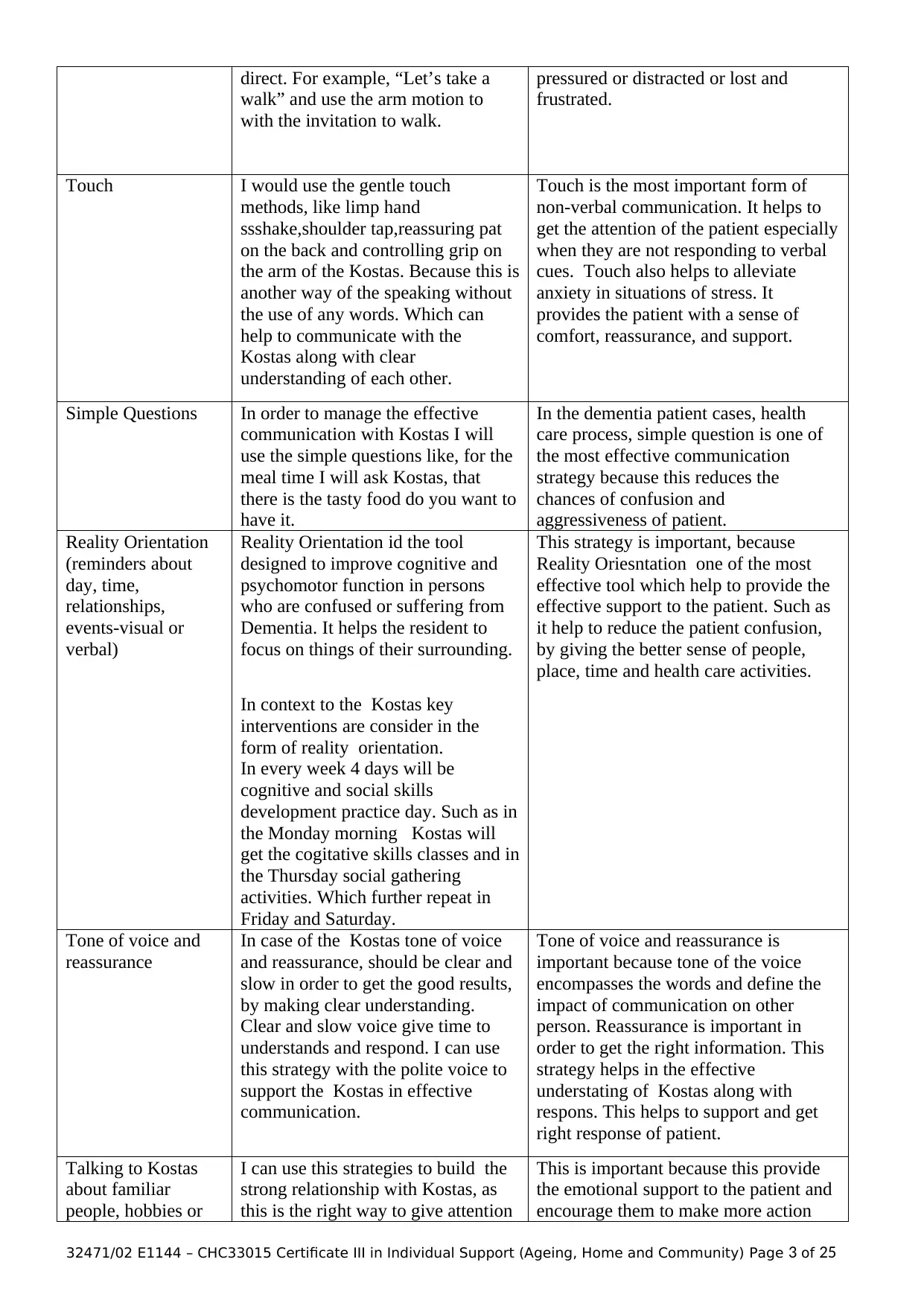
direct. For example, “Let’s take a
walk” and use the arm motion to
with the invitation to walk.
pressured or distracted or lost and
frustrated.
Touch I would use the gentle touch
methods, like limp hand
ssshake,shoulder tap,reassuring pat
on the back and controlling grip on
the arm of the Kostas. Because this is
another way of the speaking without
the use of any words. Which can
help to communicate with the
Kostas along with clear
understanding of each other.
Touch is the most important form of
non-verbal communication. It helps to
get the attention of the patient especially
when they are not responding to verbal
cues. Touch also helps to alleviate
anxiety in situations of stress. It
provides the patient with a sense of
comfort, reassurance, and support.
Simple Questions In order to manage the effective
communication with Kostas I will
use the simple questions like, for the
meal time I will ask Kostas, that
there is the tasty food do you want to
have it.
In the dementia patient cases, health
care process, simple question is one of
the most effective communication
strategy because this reduces the
chances of confusion and
aggressiveness of patient.
Reality Orientation
(reminders about
day, time,
relationships,
events-visual or
verbal)
Reality Orientation id the tool
designed to improve cognitive and
psychomotor function in persons
who are confused or suffering from
Dementia. It helps the resident to
focus on things of their surrounding.
In context to the Kostas key
interventions are consider in the
form of reality orientation.
In every week 4 days will be
cognitive and social skills
development practice day. Such as in
the Monday morning Kostas will
get the cogitative skills classes and in
the Thursday social gathering
activities. Which further repeat in
Friday and Saturday.
This strategy is important, because
Reality Oriesntation one of the most
effective tool which help to provide the
effective support to the patient. Such as
it help to reduce the patient confusion,
by giving the better sense of people,
place, time and health care activities.
Tone of voice and
reassurance
In case of the Kostas tone of voice
and reassurance, should be clear and
slow in order to get the good results,
by making clear understanding.
Clear and slow voice give time to
understands and respond. I can use
this strategy with the polite voice to
support the Kostas in effective
communication.
Tone of voice and reassurance is
important because tone of the voice
encompasses the words and define the
impact of communication on other
person. Reassurance is important in
order to get the right information. This
strategy helps in the effective
understating of Kostas along with
respons. This helps to support and get
right response of patient.
Talking to Kostas
about familiar
people, hobbies or
I can use this strategies to build the
strong relationship with Kostas, as
this is the right way to give attention
This is important because this provide
the emotional support to the patient and
encourage them to make more action
32471/02 E1144 – CHC33015 Certificate III in Individual Support (Ageing, Home and Community) Page 3 of 25
walk” and use the arm motion to
with the invitation to walk.
pressured or distracted or lost and
frustrated.
Touch I would use the gentle touch
methods, like limp hand
ssshake,shoulder tap,reassuring pat
on the back and controlling grip on
the arm of the Kostas. Because this is
another way of the speaking without
the use of any words. Which can
help to communicate with the
Kostas along with clear
understanding of each other.
Touch is the most important form of
non-verbal communication. It helps to
get the attention of the patient especially
when they are not responding to verbal
cues. Touch also helps to alleviate
anxiety in situations of stress. It
provides the patient with a sense of
comfort, reassurance, and support.
Simple Questions In order to manage the effective
communication with Kostas I will
use the simple questions like, for the
meal time I will ask Kostas, that
there is the tasty food do you want to
have it.
In the dementia patient cases, health
care process, simple question is one of
the most effective communication
strategy because this reduces the
chances of confusion and
aggressiveness of patient.
Reality Orientation
(reminders about
day, time,
relationships,
events-visual or
verbal)
Reality Orientation id the tool
designed to improve cognitive and
psychomotor function in persons
who are confused or suffering from
Dementia. It helps the resident to
focus on things of their surrounding.
In context to the Kostas key
interventions are consider in the
form of reality orientation.
In every week 4 days will be
cognitive and social skills
development practice day. Such as in
the Monday morning Kostas will
get the cogitative skills classes and in
the Thursday social gathering
activities. Which further repeat in
Friday and Saturday.
This strategy is important, because
Reality Oriesntation one of the most
effective tool which help to provide the
effective support to the patient. Such as
it help to reduce the patient confusion,
by giving the better sense of people,
place, time and health care activities.
Tone of voice and
reassurance
In case of the Kostas tone of voice
and reassurance, should be clear and
slow in order to get the good results,
by making clear understanding.
Clear and slow voice give time to
understands and respond. I can use
this strategy with the polite voice to
support the Kostas in effective
communication.
Tone of voice and reassurance is
important because tone of the voice
encompasses the words and define the
impact of communication on other
person. Reassurance is important in
order to get the right information. This
strategy helps in the effective
understating of Kostas along with
respons. This helps to support and get
right response of patient.
Talking to Kostas
about familiar
people, hobbies or
I can use this strategies to build the
strong relationship with Kostas, as
this is the right way to give attention
This is important because this provide
the emotional support to the patient and
encourage them to make more action
32471/02 E1144 – CHC33015 Certificate III in Individual Support (Ageing, Home and Community) Page 3 of 25

past occupations. to the patient interact them in
conversation, in order to improve
their condition. I will ask the patient
about hobby, such I will ask the
patient that what is your hobbies,
which you want to involve in your
care plan. Then give higher attention
to the patient answer.
and get well. This helps in the effective
communication by increasing the
interaction and relationship with the
patient. This increase the interest of
patient in care plan.
4
conversation, in order to improve
their condition. I will ask the patient
about hobby, such I will ask the
patient that what is your hobbies,
which you want to involve in your
care plan. Then give higher attention
to the patient answer.
and get well. This helps in the effective
communication by increasing the
interaction and relationship with the
patient. This increase the interest of
patient in care plan.
4
Secure Best Marks with AI Grader
Need help grading? Try our AI Grader for instant feedback on your assignments.
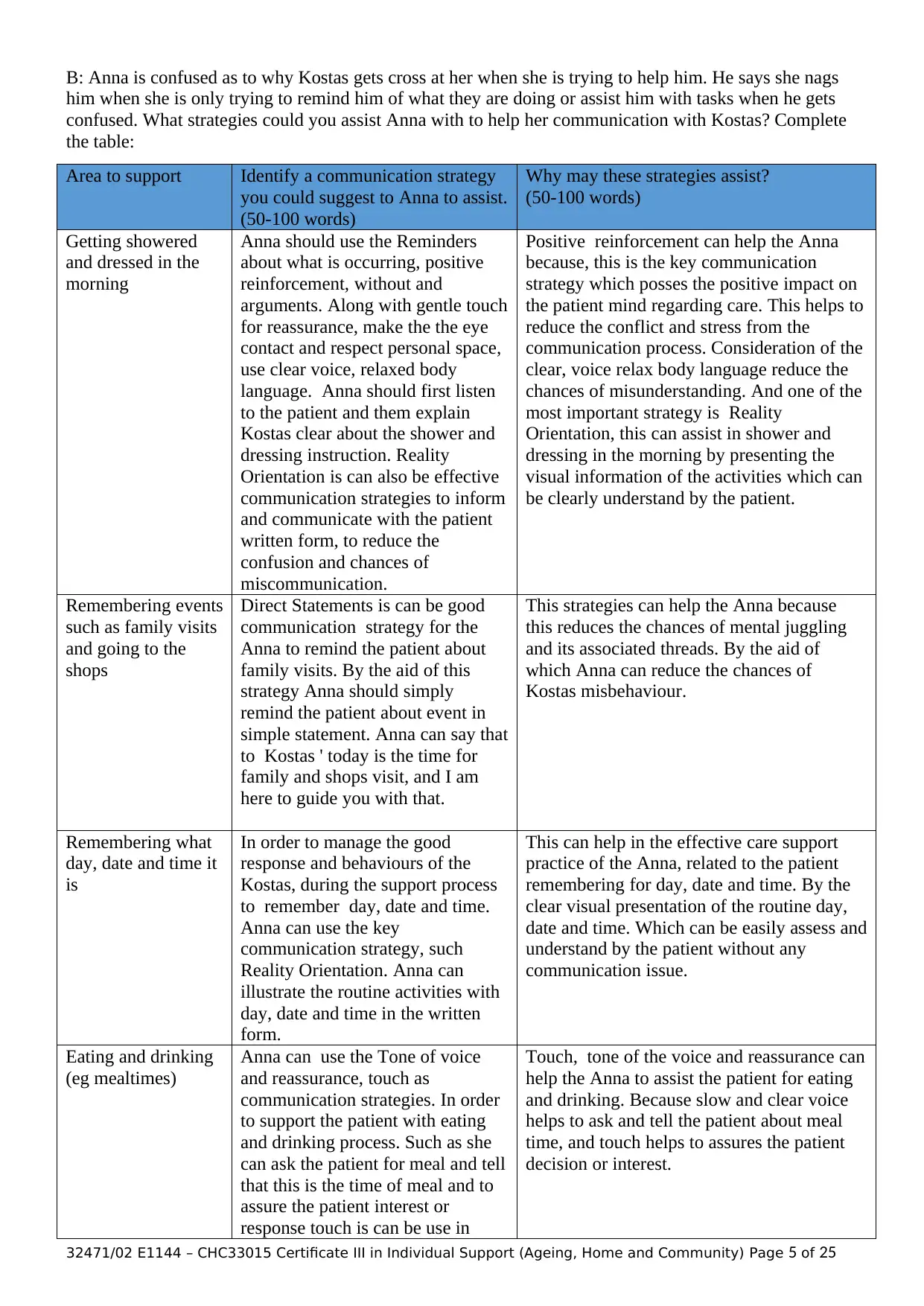
B: Anna is confused as to why Kostas gets cross at her when she is trying to help him. He says she nags
him when she is only trying to remind him of what they are doing or assist him with tasks when he gets
confused. What strategies could you assist Anna with to help her communication with Kostas? Complete
the table:
Area to support Identify a communication strategy
you could suggest to Anna to assist.
(50-100 words)
Why may these strategies assist?
(50-100 words)
Getting showered
and dressed in the
morning
Anna should use the Reminders
about what is occurring, positive
reinforcement, without and
arguments. Along with gentle touch
for reassurance, make the the eye
contact and respect personal space,
use clear voice, relaxed body
language. Anna should first listen
to the patient and them explain
Kostas clear about the shower and
dressing instruction. Reality
Orientation is can also be effective
communication strategies to inform
and communicate with the patient
written form, to reduce the
confusion and chances of
miscommunication.
Positive reinforcement can help the Anna
because, this is the key communication
strategy which posses the positive impact on
the patient mind regarding care. This helps to
reduce the conflict and stress from the
communication process. Consideration of the
clear, voice relax body language reduce the
chances of misunderstanding. And one of the
most important strategy is Reality
Orientation, this can assist in shower and
dressing in the morning by presenting the
visual information of the activities which can
be clearly understand by the patient.
Remembering events
such as family visits
and going to the
shops
Direct Statements is can be good
communication strategy for the
Anna to remind the patient about
family visits. By the aid of this
strategy Anna should simply
remind the patient about event in
simple statement. Anna can say that
to Kostas ' today is the time for
family and shops visit, and I am
here to guide you with that.
This strategies can help the Anna because
this reduces the chances of mental juggling
and its associated threads. By the aid of
which Anna can reduce the chances of
Kostas misbehaviour.
Remembering what
day, date and time it
is
In order to manage the good
response and behaviours of the
Kostas, during the support process
to remember day, date and time.
Anna can use the key
communication strategy, such
Reality Orientation. Anna can
illustrate the routine activities with
day, date and time in the written
form.
This can help in the effective care support
practice of the Anna, related to the patient
remembering for day, date and time. By the
clear visual presentation of the routine day,
date and time. Which can be easily assess and
understand by the patient without any
communication issue.
Eating and drinking
(eg mealtimes)
Anna can use the Tone of voice
and reassurance, touch as
communication strategies. In order
to support the patient with eating
and drinking process. Such as she
can ask the patient for meal and tell
that this is the time of meal and to
assure the patient interest or
response touch is can be use in
Touch, tone of the voice and reassurance can
help the Anna to assist the patient for eating
and drinking. Because slow and clear voice
helps to ask and tell the patient about meal
time, and touch helps to assures the patient
decision or interest.
32471/02 E1144 – CHC33015 Certificate III in Individual Support (Ageing, Home and Community) Page 5 of 25
him when she is only trying to remind him of what they are doing or assist him with tasks when he gets
confused. What strategies could you assist Anna with to help her communication with Kostas? Complete
the table:
Area to support Identify a communication strategy
you could suggest to Anna to assist.
(50-100 words)
Why may these strategies assist?
(50-100 words)
Getting showered
and dressed in the
morning
Anna should use the Reminders
about what is occurring, positive
reinforcement, without and
arguments. Along with gentle touch
for reassurance, make the the eye
contact and respect personal space,
use clear voice, relaxed body
language. Anna should first listen
to the patient and them explain
Kostas clear about the shower and
dressing instruction. Reality
Orientation is can also be effective
communication strategies to inform
and communicate with the patient
written form, to reduce the
confusion and chances of
miscommunication.
Positive reinforcement can help the Anna
because, this is the key communication
strategy which posses the positive impact on
the patient mind regarding care. This helps to
reduce the conflict and stress from the
communication process. Consideration of the
clear, voice relax body language reduce the
chances of misunderstanding. And one of the
most important strategy is Reality
Orientation, this can assist in shower and
dressing in the morning by presenting the
visual information of the activities which can
be clearly understand by the patient.
Remembering events
such as family visits
and going to the
shops
Direct Statements is can be good
communication strategy for the
Anna to remind the patient about
family visits. By the aid of this
strategy Anna should simply
remind the patient about event in
simple statement. Anna can say that
to Kostas ' today is the time for
family and shops visit, and I am
here to guide you with that.
This strategies can help the Anna because
this reduces the chances of mental juggling
and its associated threads. By the aid of
which Anna can reduce the chances of
Kostas misbehaviour.
Remembering what
day, date and time it
is
In order to manage the good
response and behaviours of the
Kostas, during the support process
to remember day, date and time.
Anna can use the key
communication strategy, such
Reality Orientation. Anna can
illustrate the routine activities with
day, date and time in the written
form.
This can help in the effective care support
practice of the Anna, related to the patient
remembering for day, date and time. By the
clear visual presentation of the routine day,
date and time. Which can be easily assess and
understand by the patient without any
communication issue.
Eating and drinking
(eg mealtimes)
Anna can use the Tone of voice
and reassurance, touch as
communication strategies. In order
to support the patient with eating
and drinking process. Such as she
can ask the patient for meal and tell
that this is the time of meal and to
assure the patient interest or
response touch is can be use in
Touch, tone of the voice and reassurance can
help the Anna to assist the patient for eating
and drinking. Because slow and clear voice
helps to ask and tell the patient about meal
time, and touch helps to assures the patient
decision or interest.
32471/02 E1144 – CHC33015 Certificate III in Individual Support (Ageing, Home and Community) Page 5 of 25

gentle form. Anna can tap to the
patient shoulder to seek attention
for conversation and confirmation.
6
patient shoulder to seek attention
for conversation and confirmation.
6
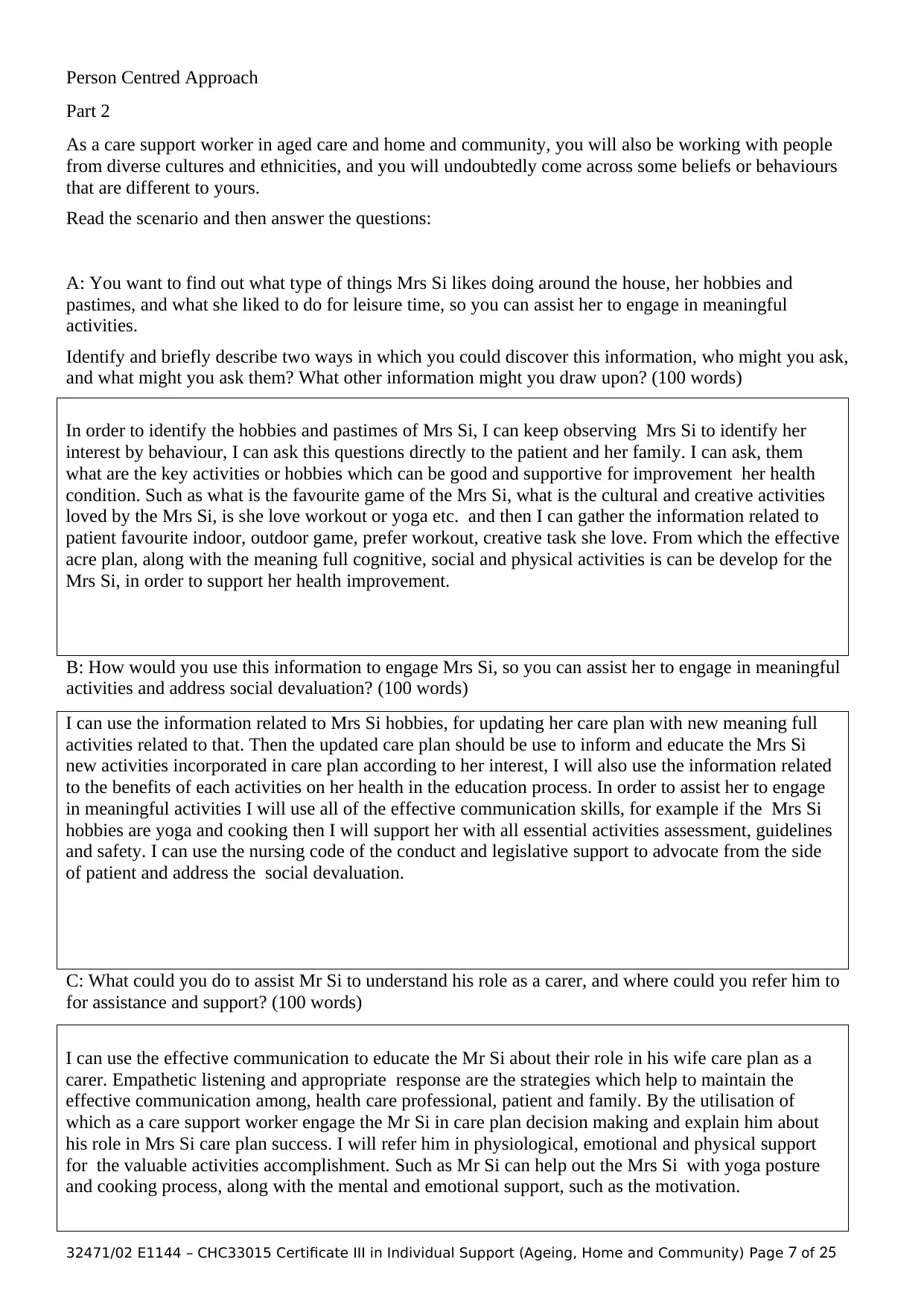
Person Centred Approach
Part 2
As a care support worker in aged care and home and community, you will also be working with people
from diverse cultures and ethnicities, and you will undoubtedly come across some beliefs or behaviours
that are different to yours.
Read the scenario and then answer the questions:
A: You want to find out what type of things Mrs Si likes doing around the house, her hobbies and
pastimes, and what she liked to do for leisure time, so you can assist her to engage in meaningful
activities.
Identify and briefly describe two ways in which you could discover this information, who might you ask,
and what might you ask them? What other information might you draw upon? (100 words)
In order to identify the hobbies and pastimes of Mrs Si, I can keep observing Mrs Si to identify her
interest by behaviour, I can ask this questions directly to the patient and her family. I can ask, them
what are the key activities or hobbies which can be good and supportive for improvement her health
condition. Such as what is the favourite game of the Mrs Si, what is the cultural and creative activities
loved by the Mrs Si, is she love workout or yoga etc. and then I can gather the information related to
patient favourite indoor, outdoor game, prefer workout, creative task she love. From which the effective
acre plan, along with the meaning full cognitive, social and physical activities is can be develop for the
Mrs Si, in order to support her health improvement.
B: How would you use this information to engage Mrs Si, so you can assist her to engage in meaningful
activities and address social devaluation? (100 words)
I can use the information related to Mrs Si hobbies, for updating her care plan with new meaning full
activities related to that. Then the updated care plan should be use to inform and educate the Mrs Si
new activities incorporated in care plan according to her interest, I will also use the information related
to the benefits of each activities on her health in the education process. In order to assist her to engage
in meaningful activities I will use all of the effective communication skills, for example if the Mrs Si
hobbies are yoga and cooking then I will support her with all essential activities assessment, guidelines
and safety. I can use the nursing code of the conduct and legislative support to advocate from the side
of patient and address the social devaluation.
C: What could you do to assist Mr Si to understand his role as a carer, and where could you refer him to
for assistance and support? (100 words)
I can use the effective communication to educate the Mr Si about their role in his wife care plan as a
carer. Empathetic listening and appropriate response are the strategies which help to maintain the
effective communication among, health care professional, patient and family. By the utilisation of
which as a care support worker engage the Mr Si in care plan decision making and explain him about
his role in Mrs Si care plan success. I will refer him in physiological, emotional and physical support
for the valuable activities accomplishment. Such as Mr Si can help out the Mrs Si with yoga posture
and cooking process, along with the mental and emotional support, such as the motivation.
32471/02 E1144 – CHC33015 Certificate III in Individual Support (Ageing, Home and Community) Page 7 of 25
Part 2
As a care support worker in aged care and home and community, you will also be working with people
from diverse cultures and ethnicities, and you will undoubtedly come across some beliefs or behaviours
that are different to yours.
Read the scenario and then answer the questions:
A: You want to find out what type of things Mrs Si likes doing around the house, her hobbies and
pastimes, and what she liked to do for leisure time, so you can assist her to engage in meaningful
activities.
Identify and briefly describe two ways in which you could discover this information, who might you ask,
and what might you ask them? What other information might you draw upon? (100 words)
In order to identify the hobbies and pastimes of Mrs Si, I can keep observing Mrs Si to identify her
interest by behaviour, I can ask this questions directly to the patient and her family. I can ask, them
what are the key activities or hobbies which can be good and supportive for improvement her health
condition. Such as what is the favourite game of the Mrs Si, what is the cultural and creative activities
loved by the Mrs Si, is she love workout or yoga etc. and then I can gather the information related to
patient favourite indoor, outdoor game, prefer workout, creative task she love. From which the effective
acre plan, along with the meaning full cognitive, social and physical activities is can be develop for the
Mrs Si, in order to support her health improvement.
B: How would you use this information to engage Mrs Si, so you can assist her to engage in meaningful
activities and address social devaluation? (100 words)
I can use the information related to Mrs Si hobbies, for updating her care plan with new meaning full
activities related to that. Then the updated care plan should be use to inform and educate the Mrs Si
new activities incorporated in care plan according to her interest, I will also use the information related
to the benefits of each activities on her health in the education process. In order to assist her to engage
in meaningful activities I will use all of the effective communication skills, for example if the Mrs Si
hobbies are yoga and cooking then I will support her with all essential activities assessment, guidelines
and safety. I can use the nursing code of the conduct and legislative support to advocate from the side
of patient and address the social devaluation.
C: What could you do to assist Mr Si to understand his role as a carer, and where could you refer him to
for assistance and support? (100 words)
I can use the effective communication to educate the Mr Si about their role in his wife care plan as a
carer. Empathetic listening and appropriate response are the strategies which help to maintain the
effective communication among, health care professional, patient and family. By the utilisation of
which as a care support worker engage the Mr Si in care plan decision making and explain him about
his role in Mrs Si care plan success. I will refer him in physiological, emotional and physical support
for the valuable activities accomplishment. Such as Mr Si can help out the Mrs Si with yoga posture
and cooking process, along with the mental and emotional support, such as the motivation.
32471/02 E1144 – CHC33015 Certificate III in Individual Support (Ageing, Home and Community) Page 7 of 25
Paraphrase This Document
Need a fresh take? Get an instant paraphrase of this document with our AI Paraphraser

Providing activities to support maintenance of dignity, skills and health
Part 3
As a care support worker in aged care and home and community, you may be called upon to provide care
support for younger people with dementia.
Read the scenario and then answer the questions:
8
Part 3
As a care support worker in aged care and home and community, you may be called upon to provide care
support for younger people with dementia.
Read the scenario and then answer the questions:
8
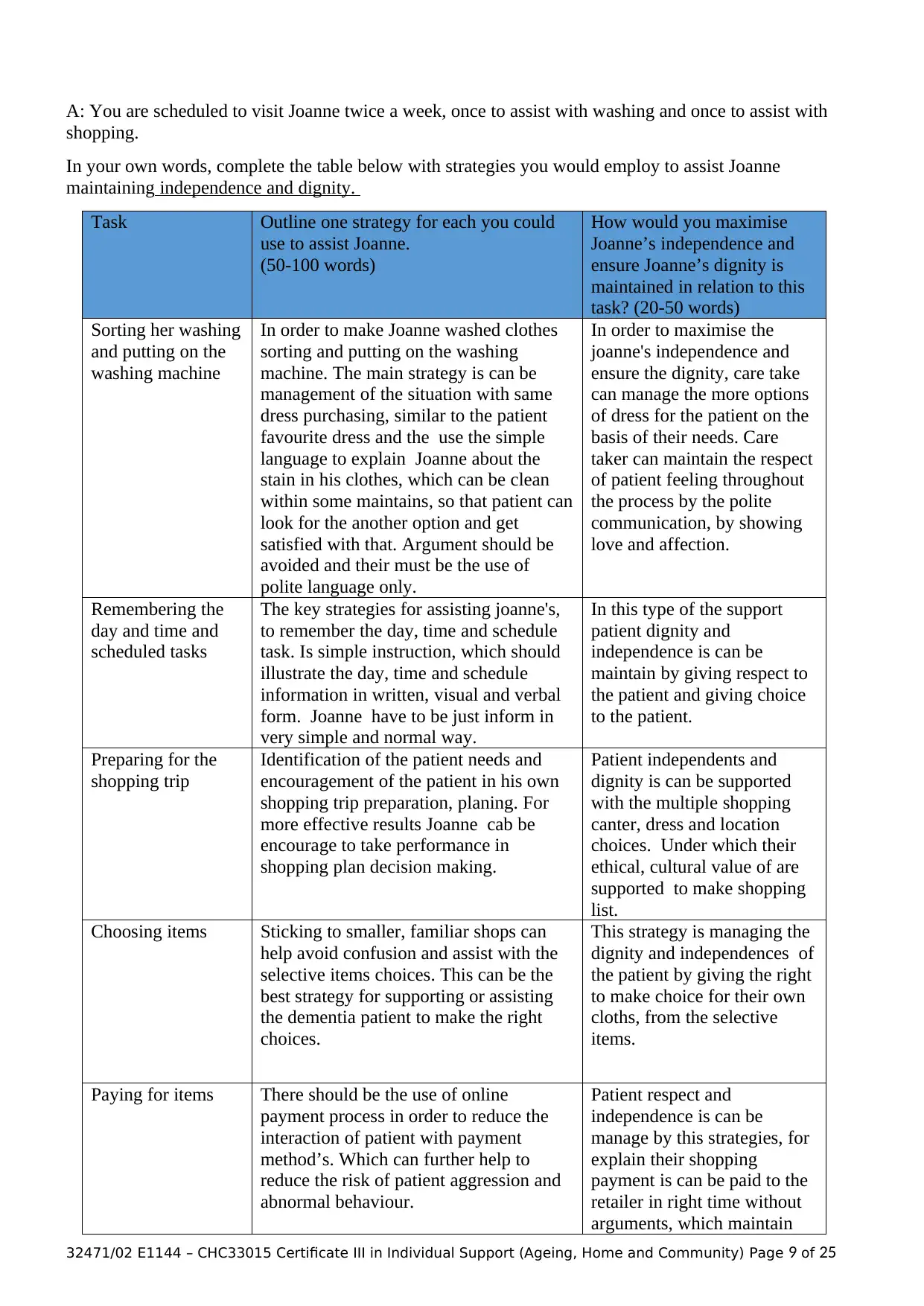
A: You are scheduled to visit Joanne twice a week, once to assist with washing and once to assist with
shopping.
In your own words, complete the table below with strategies you would employ to assist Joanne
maintaining independence and dignity.
Task Outline one strategy for each you could
use to assist Joanne.
(50-100 words)
How would you maximise
Joanne’s independence and
ensure Joanne’s dignity is
maintained in relation to this
task? (20-50 words)
Sorting her washing
and putting on the
washing machine
In order to make Joanne washed clothes
sorting and putting on the washing
machine. The main strategy is can be
management of the situation with same
dress purchasing, similar to the patient
favourite dress and the use the simple
language to explain Joanne about the
stain in his clothes, which can be clean
within some maintains, so that patient can
look for the another option and get
satisfied with that. Argument should be
avoided and their must be the use of
polite language only.
In order to maximise the
joanne's independence and
ensure the dignity, care take
can manage the more options
of dress for the patient on the
basis of their needs. Care
taker can maintain the respect
of patient feeling throughout
the process by the polite
communication, by showing
love and affection.
Remembering the
day and time and
scheduled tasks
The key strategies for assisting joanne's,
to remember the day, time and schedule
task. Is simple instruction, which should
illustrate the day, time and schedule
information in written, visual and verbal
form. Joanne have to be just inform in
very simple and normal way.
In this type of the support
patient dignity and
independence is can be
maintain by giving respect to
the patient and giving choice
to the patient.
Preparing for the
shopping trip
Identification of the patient needs and
encouragement of the patient in his own
shopping trip preparation, planing. For
more effective results Joanne cab be
encourage to take performance in
shopping plan decision making.
Patient independents and
dignity is can be supported
with the multiple shopping
canter, dress and location
choices. Under which their
ethical, cultural value of are
supported to make shopping
list.
Choosing items Sticking to smaller, familiar shops can
help avoid confusion and assist with the
selective items choices. This can be the
best strategy for supporting or assisting
the dementia patient to make the right
choices.
This strategy is managing the
dignity and independences of
the patient by giving the right
to make choice for their own
cloths, from the selective
items.
Paying for items There should be the use of online
payment process in order to reduce the
interaction of patient with payment
method’s. Which can further help to
reduce the risk of patient aggression and
abnormal behaviour.
Patient respect and
independence is can be
manage by this strategies, for
explain their shopping
payment is can be paid to the
retailer in right time without
arguments, which maintain
32471/02 E1144 – CHC33015 Certificate III in Individual Support (Ageing, Home and Community) Page 9 of 25
shopping.
In your own words, complete the table below with strategies you would employ to assist Joanne
maintaining independence and dignity.
Task Outline one strategy for each you could
use to assist Joanne.
(50-100 words)
How would you maximise
Joanne’s independence and
ensure Joanne’s dignity is
maintained in relation to this
task? (20-50 words)
Sorting her washing
and putting on the
washing machine
In order to make Joanne washed clothes
sorting and putting on the washing
machine. The main strategy is can be
management of the situation with same
dress purchasing, similar to the patient
favourite dress and the use the simple
language to explain Joanne about the
stain in his clothes, which can be clean
within some maintains, so that patient can
look for the another option and get
satisfied with that. Argument should be
avoided and their must be the use of
polite language only.
In order to maximise the
joanne's independence and
ensure the dignity, care take
can manage the more options
of dress for the patient on the
basis of their needs. Care
taker can maintain the respect
of patient feeling throughout
the process by the polite
communication, by showing
love and affection.
Remembering the
day and time and
scheduled tasks
The key strategies for assisting joanne's,
to remember the day, time and schedule
task. Is simple instruction, which should
illustrate the day, time and schedule
information in written, visual and verbal
form. Joanne have to be just inform in
very simple and normal way.
In this type of the support
patient dignity and
independence is can be
maintain by giving respect to
the patient and giving choice
to the patient.
Preparing for the
shopping trip
Identification of the patient needs and
encouragement of the patient in his own
shopping trip preparation, planing. For
more effective results Joanne cab be
encourage to take performance in
shopping plan decision making.
Patient independents and
dignity is can be supported
with the multiple shopping
canter, dress and location
choices. Under which their
ethical, cultural value of are
supported to make shopping
list.
Choosing items Sticking to smaller, familiar shops can
help avoid confusion and assist with the
selective items choices. This can be the
best strategy for supporting or assisting
the dementia patient to make the right
choices.
This strategy is managing the
dignity and independences of
the patient by giving the right
to make choice for their own
cloths, from the selective
items.
Paying for items There should be the use of online
payment process in order to reduce the
interaction of patient with payment
method’s. Which can further help to
reduce the risk of patient aggression and
abnormal behaviour.
Patient respect and
independence is can be
manage by this strategies, for
explain their shopping
payment is can be paid to the
retailer in right time without
arguments, which maintain
32471/02 E1144 – CHC33015 Certificate III in Individual Support (Ageing, Home and Community) Page 9 of 25
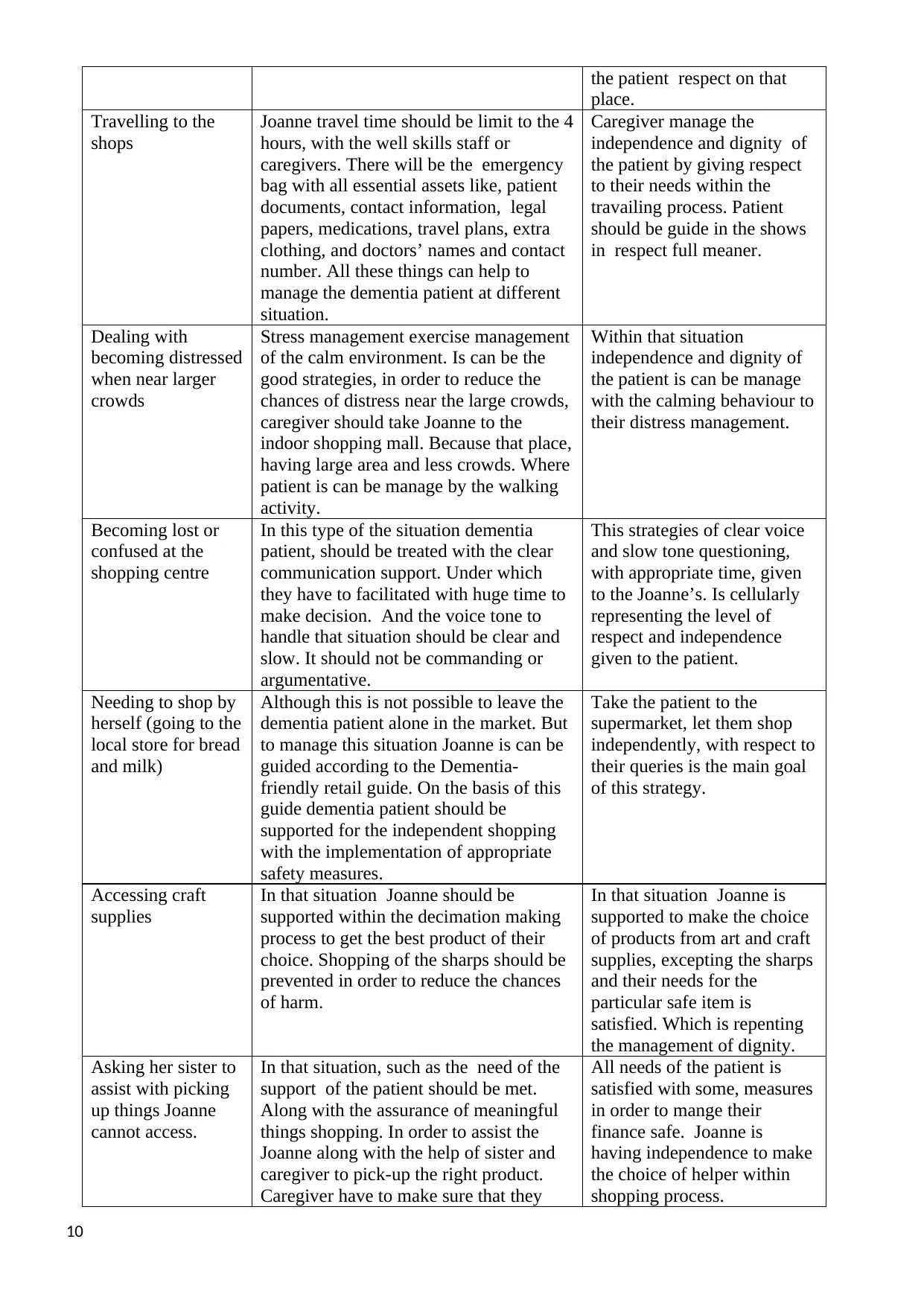
the patient respect on that
place.
Travelling to the
shops
Joanne travel time should be limit to the 4
hours, with the well skills staff or
caregivers. There will be the emergency
bag with all essential assets like, patient
documents, contact information, legal
papers, medications, travel plans, extra
clothing, and doctors’ names and contact
number. All these things can help to
manage the dementia patient at different
situation.
Caregiver manage the
independence and dignity of
the patient by giving respect
to their needs within the
travailing process. Patient
should be guide in the shows
in respect full meaner.
Dealing with
becoming distressed
when near larger
crowds
Stress management exercise management
of the calm environment. Is can be the
good strategies, in order to reduce the
chances of distress near the large crowds,
caregiver should take Joanne to the
indoor shopping mall. Because that place,
having large area and less crowds. Where
patient is can be manage by the walking
activity.
Within that situation
independence and dignity of
the patient is can be manage
with the calming behaviour to
their distress management.
Becoming lost or
confused at the
shopping centre
In this type of the situation dementia
patient, should be treated with the clear
communication support. Under which
they have to facilitated with huge time to
make decision. And the voice tone to
handle that situation should be clear and
slow. It should not be commanding or
argumentative.
This strategies of clear voice
and slow tone questioning,
with appropriate time, given
to the Joanne’s. Is cellularly
representing the level of
respect and independence
given to the patient.
Needing to shop by
herself (going to the
local store for bread
and milk)
Although this is not possible to leave the
dementia patient alone in the market. But
to manage this situation Joanne is can be
guided according to the Dementia-
friendly retail guide. On the basis of this
guide dementia patient should be
supported for the independent shopping
with the implementation of appropriate
safety measures.
Take the patient to the
supermarket, let them shop
independently, with respect to
their queries is the main goal
of this strategy.
Accessing craft
supplies
In that situation Joanne should be
supported within the decimation making
process to get the best product of their
choice. Shopping of the sharps should be
prevented in order to reduce the chances
of harm.
In that situation Joanne is
supported to make the choice
of products from art and craft
supplies, excepting the sharps
and their needs for the
particular safe item is
satisfied. Which is repenting
the management of dignity.
Asking her sister to
assist with picking
up things Joanne
cannot access.
In that situation, such as the need of the
support of the patient should be met.
Along with the assurance of meaningful
things shopping. In order to assist the
Joanne along with the help of sister and
caregiver to pick-up the right product.
Caregiver have to make sure that they
All needs of the patient is
satisfied with some, measures
in order to mange their
finance safe. Joanne is
having independence to make
the choice of helper within
shopping process.
10
place.
Travelling to the
shops
Joanne travel time should be limit to the 4
hours, with the well skills staff or
caregivers. There will be the emergency
bag with all essential assets like, patient
documents, contact information, legal
papers, medications, travel plans, extra
clothing, and doctors’ names and contact
number. All these things can help to
manage the dementia patient at different
situation.
Caregiver manage the
independence and dignity of
the patient by giving respect
to their needs within the
travailing process. Patient
should be guide in the shows
in respect full meaner.
Dealing with
becoming distressed
when near larger
crowds
Stress management exercise management
of the calm environment. Is can be the
good strategies, in order to reduce the
chances of distress near the large crowds,
caregiver should take Joanne to the
indoor shopping mall. Because that place,
having large area and less crowds. Where
patient is can be manage by the walking
activity.
Within that situation
independence and dignity of
the patient is can be manage
with the calming behaviour to
their distress management.
Becoming lost or
confused at the
shopping centre
In this type of the situation dementia
patient, should be treated with the clear
communication support. Under which
they have to facilitated with huge time to
make decision. And the voice tone to
handle that situation should be clear and
slow. It should not be commanding or
argumentative.
This strategies of clear voice
and slow tone questioning,
with appropriate time, given
to the Joanne’s. Is cellularly
representing the level of
respect and independence
given to the patient.
Needing to shop by
herself (going to the
local store for bread
and milk)
Although this is not possible to leave the
dementia patient alone in the market. But
to manage this situation Joanne is can be
guided according to the Dementia-
friendly retail guide. On the basis of this
guide dementia patient should be
supported for the independent shopping
with the implementation of appropriate
safety measures.
Take the patient to the
supermarket, let them shop
independently, with respect to
their queries is the main goal
of this strategy.
Accessing craft
supplies
In that situation Joanne should be
supported within the decimation making
process to get the best product of their
choice. Shopping of the sharps should be
prevented in order to reduce the chances
of harm.
In that situation Joanne is
supported to make the choice
of products from art and craft
supplies, excepting the sharps
and their needs for the
particular safe item is
satisfied. Which is repenting
the management of dignity.
Asking her sister to
assist with picking
up things Joanne
cannot access.
In that situation, such as the need of the
support of the patient should be met.
Along with the assurance of meaningful
things shopping. In order to assist the
Joanne along with the help of sister and
caregiver to pick-up the right product.
Caregiver have to make sure that they
All needs of the patient is
satisfied with some, measures
in order to mange their
finance safe. Joanne is
having independence to make
the choice of helper within
shopping process.
10
Secure Best Marks with AI Grader
Need help grading? Try our AI Grader for instant feedback on your assignments.

communicate to the patient and explain
them the difference between important
and unnecessary products.
32471/02 E1144 – CHC33015 Certificate III in Individual Support (Ageing, Home and Community) Page 11 of 25
them the difference between important
and unnecessary products.
32471/02 E1144 – CHC33015 Certificate III in Individual Support (Ageing, Home and Community) Page 11 of 25
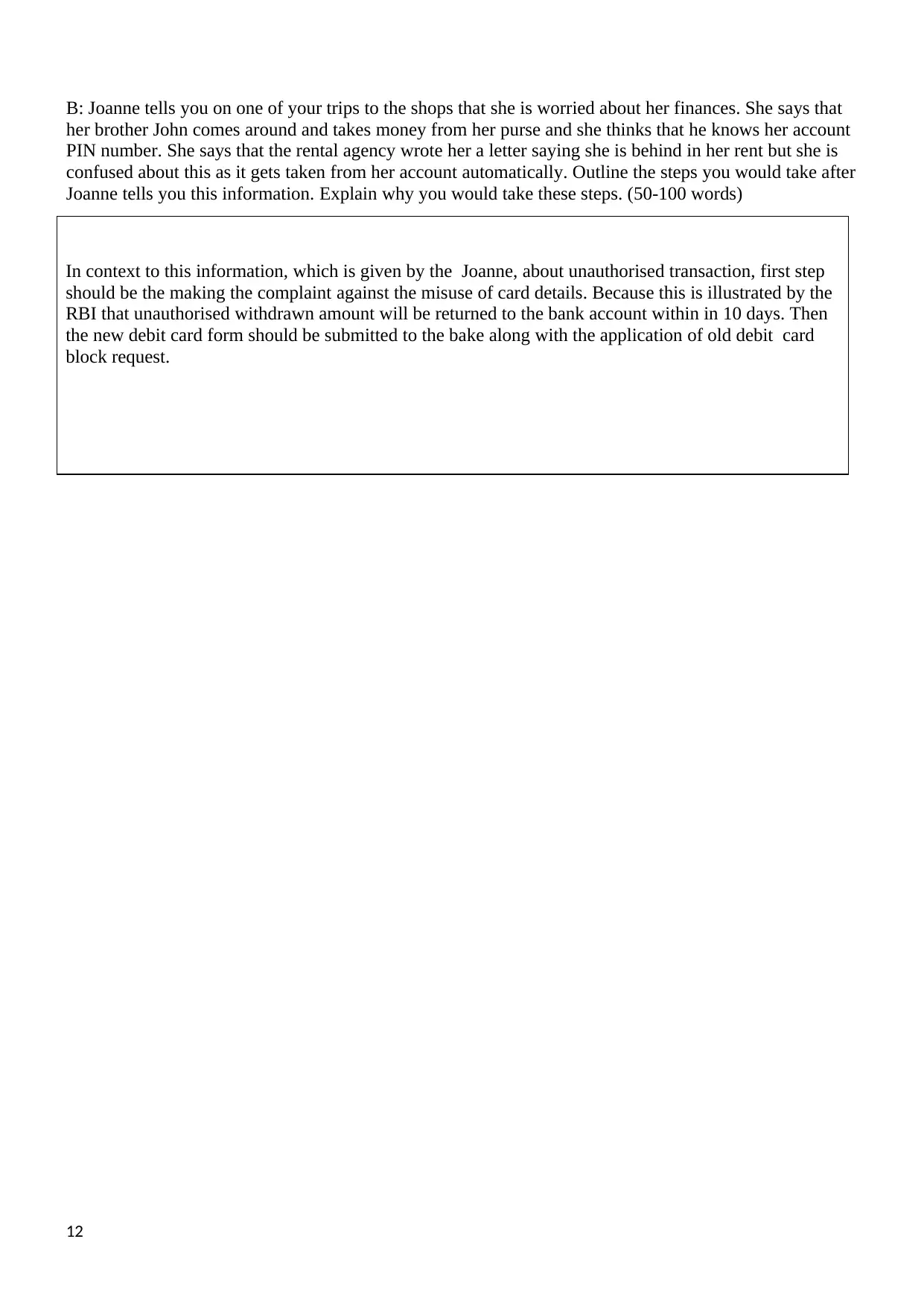
B: Joanne tells you on one of your trips to the shops that she is worried about her finances. She says that
her brother John comes around and takes money from her purse and she thinks that he knows her account
PIN number. She says that the rental agency wrote her a letter saying she is behind in her rent but she is
confused about this as it gets taken from her account automatically. Outline the steps you would take after
Joanne tells you this information. Explain why you would take these steps. (50-100 words)
In context to this information, which is given by the Joanne, about unauthorised transaction, first step
should be the making the complaint against the misuse of card details. Because this is illustrated by the
RBI that unauthorised withdrawn amount will be returned to the bank account within in 10 days. Then
the new debit card form should be submitted to the bake along with the application of old debit card
block request.
12
her brother John comes around and takes money from her purse and she thinks that he knows her account
PIN number. She says that the rental agency wrote her a letter saying she is behind in her rent but she is
confused about this as it gets taken from her account automatically. Outline the steps you would take after
Joanne tells you this information. Explain why you would take these steps. (50-100 words)
In context to this information, which is given by the Joanne, about unauthorised transaction, first step
should be the making the complaint against the misuse of card details. Because this is illustrated by the
RBI that unauthorised withdrawn amount will be returned to the bank account within in 10 days. Then
the new debit card form should be submitted to the bake along with the application of old debit card
block request.
12
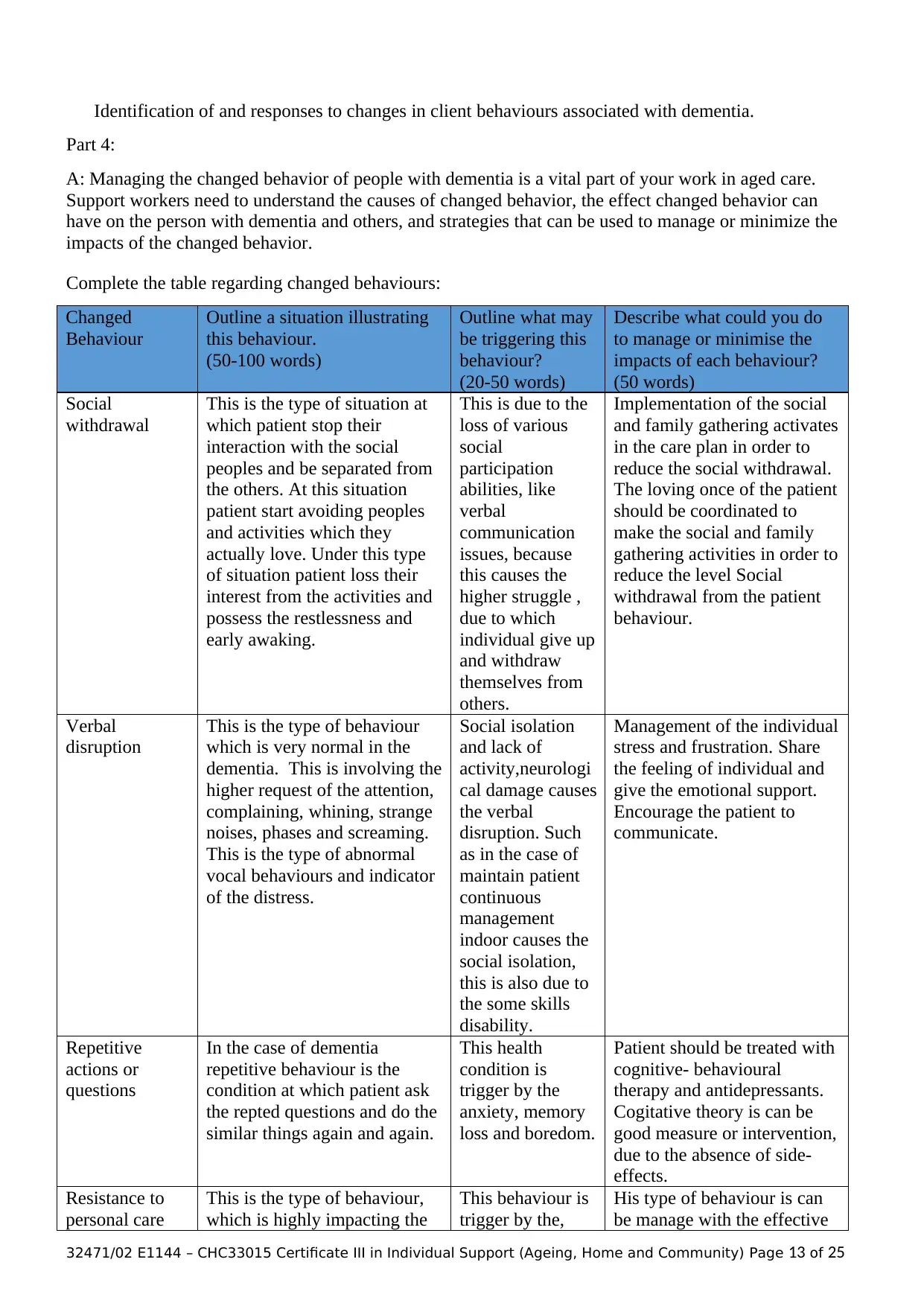
Identification of and responses to changes in client behaviours associated with dementia.
Part 4:
A: Managing the changed behavior of people with dementia is a vital part of your work in aged care.
Support workers need to understand the causes of changed behavior, the effect changed behavior can
have on the person with dementia and others, and strategies that can be used to manage or minimize the
impacts of the changed behavior.
Complete the table regarding changed behaviours:
Changed
Behaviour
Outline a situation illustrating
this behaviour.
(50-100 words)
Outline what may
be triggering this
behaviour?
(20-50 words)
Describe what could you do
to manage or minimise the
impacts of each behaviour?
(50 words)
Social
withdrawal
This is the type of situation at
which patient stop their
interaction with the social
peoples and be separated from
the others. At this situation
patient start avoiding peoples
and activities which they
actually love. Under this type
of situation patient loss their
interest from the activities and
possess the restlessness and
early awaking.
This is due to the
loss of various
social
participation
abilities, like
verbal
communication
issues, because
this causes the
higher struggle ,
due to which
individual give up
and withdraw
themselves from
others.
Implementation of the social
and family gathering activates
in the care plan in order to
reduce the social withdrawal.
The loving once of the patient
should be coordinated to
make the social and family
gathering activities in order to
reduce the level Social
withdrawal from the patient
behaviour.
Verbal
disruption
This is the type of behaviour
which is very normal in the
dementia. This is involving the
higher request of the attention,
complaining, whining, strange
noises, phases and screaming.
This is the type of abnormal
vocal behaviours and indicator
of the distress.
Social isolation
and lack of
activity,neurologi
cal damage causes
the verbal
disruption. Such
as in the case of
maintain patient
continuous
management
indoor causes the
social isolation,
this is also due to
the some skills
disability.
Management of the individual
stress and frustration. Share
the feeling of individual and
give the emotional support.
Encourage the patient to
communicate.
Repetitive
actions or
questions
In the case of dementia
repetitive behaviour is the
condition at which patient ask
the repted questions and do the
similar things again and again.
This health
condition is
trigger by the
anxiety, memory
loss and boredom.
Patient should be treated with
cognitive- behavioural
therapy and antidepressants.
Cogitative theory is can be
good measure or intervention,
due to the absence of side-
effects.
Resistance to
personal care
This is the type of behaviour,
which is highly impacting the
This behaviour is
trigger by the,
His type of behaviour is can
be manage with the effective
32471/02 E1144 – CHC33015 Certificate III in Individual Support (Ageing, Home and Community) Page 13 of 25
Part 4:
A: Managing the changed behavior of people with dementia is a vital part of your work in aged care.
Support workers need to understand the causes of changed behavior, the effect changed behavior can
have on the person with dementia and others, and strategies that can be used to manage or minimize the
impacts of the changed behavior.
Complete the table regarding changed behaviours:
Changed
Behaviour
Outline a situation illustrating
this behaviour.
(50-100 words)
Outline what may
be triggering this
behaviour?
(20-50 words)
Describe what could you do
to manage or minimise the
impacts of each behaviour?
(50 words)
Social
withdrawal
This is the type of situation at
which patient stop their
interaction with the social
peoples and be separated from
the others. At this situation
patient start avoiding peoples
and activities which they
actually love. Under this type
of situation patient loss their
interest from the activities and
possess the restlessness and
early awaking.
This is due to the
loss of various
social
participation
abilities, like
verbal
communication
issues, because
this causes the
higher struggle ,
due to which
individual give up
and withdraw
themselves from
others.
Implementation of the social
and family gathering activates
in the care plan in order to
reduce the social withdrawal.
The loving once of the patient
should be coordinated to
make the social and family
gathering activities in order to
reduce the level Social
withdrawal from the patient
behaviour.
Verbal
disruption
This is the type of behaviour
which is very normal in the
dementia. This is involving the
higher request of the attention,
complaining, whining, strange
noises, phases and screaming.
This is the type of abnormal
vocal behaviours and indicator
of the distress.
Social isolation
and lack of
activity,neurologi
cal damage causes
the verbal
disruption. Such
as in the case of
maintain patient
continuous
management
indoor causes the
social isolation,
this is also due to
the some skills
disability.
Management of the individual
stress and frustration. Share
the feeling of individual and
give the emotional support.
Encourage the patient to
communicate.
Repetitive
actions or
questions
In the case of dementia
repetitive behaviour is the
condition at which patient ask
the repted questions and do the
similar things again and again.
This health
condition is
trigger by the
anxiety, memory
loss and boredom.
Patient should be treated with
cognitive- behavioural
therapy and antidepressants.
Cogitative theory is can be
good measure or intervention,
due to the absence of side-
effects.
Resistance to
personal care
This is the type of behaviour,
which is highly impacting the
This behaviour is
trigger by the,
His type of behaviour is can
be manage with the effective
32471/02 E1144 – CHC33015 Certificate III in Individual Support (Ageing, Home and Community) Page 13 of 25
Paraphrase This Document
Need a fresh take? Get an instant paraphrase of this document with our AI Paraphraser
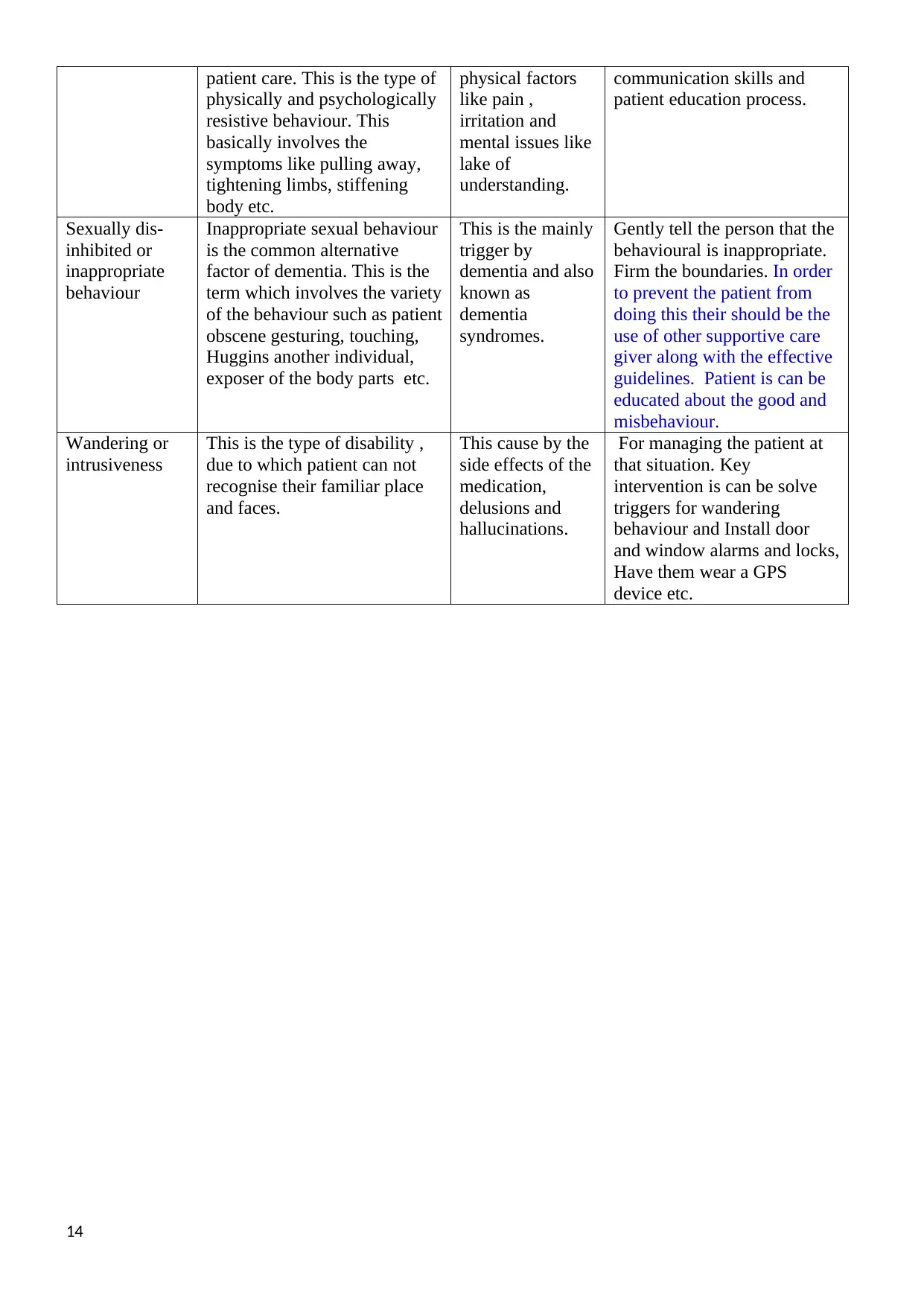
patient care. This is the type of
physically and psychologically
resistive behaviour. This
basically involves the
symptoms like pulling away,
tightening limbs, stiffening
body etc.
physical factors
like pain ,
irritation and
mental issues like
lake of
understanding.
communication skills and
patient education process.
Sexually dis-
inhibited or
inappropriate
behaviour
Inappropriate sexual behaviour
is the common alternative
factor of dementia. This is the
term which involves the variety
of the behaviour such as patient
obscene gesturing, touching,
Huggins another individual,
exposer of the body parts etc.
This is the mainly
trigger by
dementia and also
known as
dementia
syndromes.
Gently tell the person that the
behavioural is inappropriate.
Firm the boundaries. In order
to prevent the patient from
doing this their should be the
use of other supportive care
giver along with the effective
guidelines. Patient is can be
educated about the good and
misbehaviour.
Wandering or
intrusiveness
This is the type of disability ,
due to which patient can not
recognise their familiar place
and faces.
This cause by the
side effects of the
medication,
delusions and
hallucinations.
For managing the patient at
that situation. Key
intervention is can be solve
triggers for wandering
behaviour and Install door
and window alarms and locks,
Have them wear a GPS
device etc.
14
physically and psychologically
resistive behaviour. This
basically involves the
symptoms like pulling away,
tightening limbs, stiffening
body etc.
physical factors
like pain ,
irritation and
mental issues like
lake of
understanding.
communication skills and
patient education process.
Sexually dis-
inhibited or
inappropriate
behaviour
Inappropriate sexual behaviour
is the common alternative
factor of dementia. This is the
term which involves the variety
of the behaviour such as patient
obscene gesturing, touching,
Huggins another individual,
exposer of the body parts etc.
This is the mainly
trigger by
dementia and also
known as
dementia
syndromes.
Gently tell the person that the
behavioural is inappropriate.
Firm the boundaries. In order
to prevent the patient from
doing this their should be the
use of other supportive care
giver along with the effective
guidelines. Patient is can be
educated about the good and
misbehaviour.
Wandering or
intrusiveness
This is the type of disability ,
due to which patient can not
recognise their familiar place
and faces.
This cause by the
side effects of the
medication,
delusions and
hallucinations.
For managing the patient at
that situation. Key
intervention is can be solve
triggers for wandering
behaviour and Install door
and window alarms and locks,
Have them wear a GPS
device etc.
14
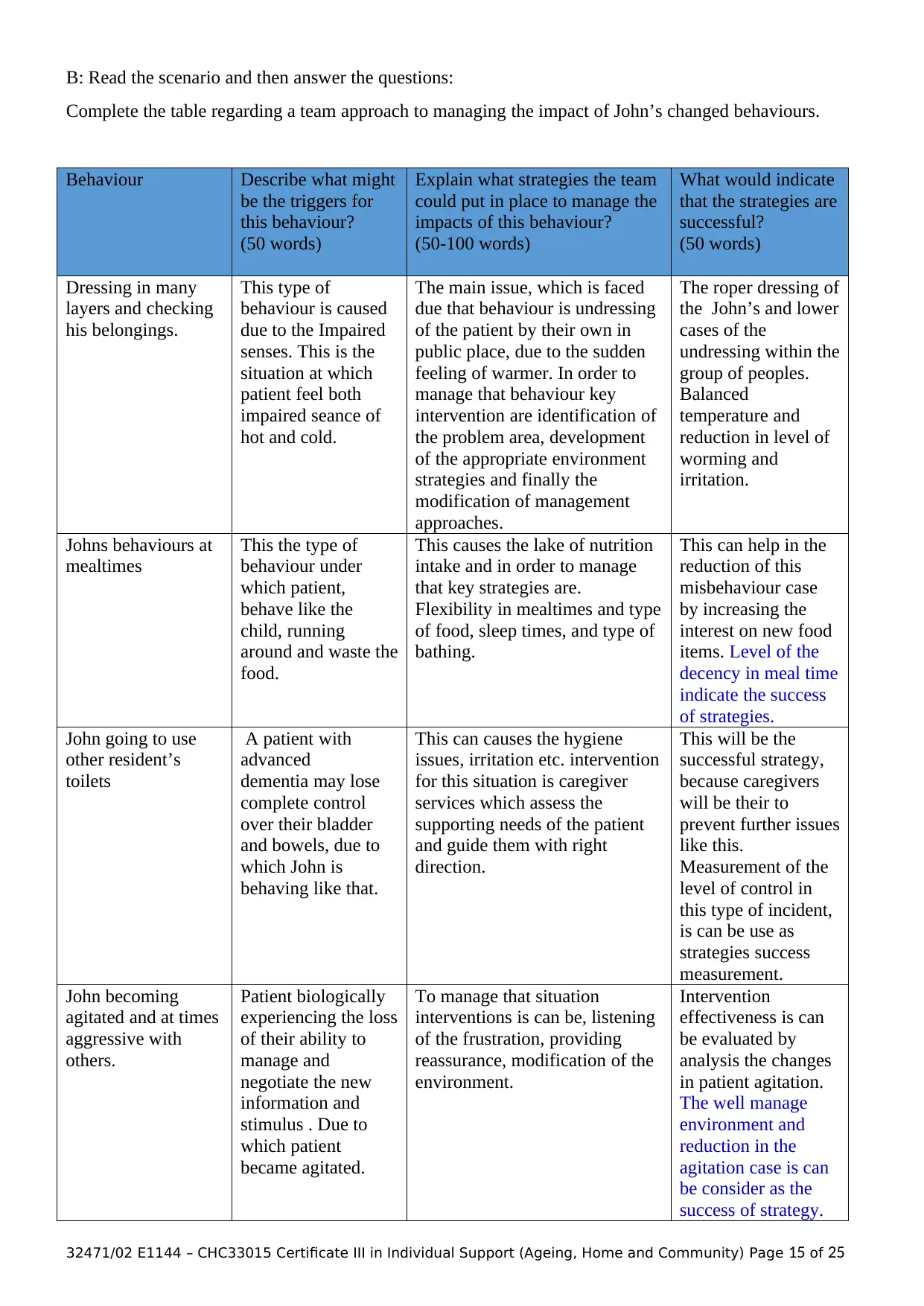
B: Read the scenario and then answer the questions:
Complete the table regarding a team approach to managing the impact of John’s changed behaviours.
Behaviour Describe what might
be the triggers for
this behaviour?
(50 words)
Explain what strategies the team
could put in place to manage the
impacts of this behaviour?
(50-100 words)
What would indicate
that the strategies are
successful?
(50 words)
Dressing in many
layers and checking
his belongings.
This type of
behaviour is caused
due to the Impaired
senses. This is the
situation at which
patient feel both
impaired seance of
hot and cold.
The main issue, which is faced
due that behaviour is undressing
of the patient by their own in
public place, due to the sudden
feeling of warmer. In order to
manage that behaviour key
intervention are identification of
the problem area, development
of the appropriate environment
strategies and finally the
modification of management
approaches.
The roper dressing of
the John’s and lower
cases of the
undressing within the
group of peoples.
Balanced
temperature and
reduction in level of
worming and
irritation.
Johns behaviours at
mealtimes
This the type of
behaviour under
which patient,
behave like the
child, running
around and waste the
food.
This causes the lake of nutrition
intake and in order to manage
that key strategies are.
Flexibility in mealtimes and type
of food, sleep times, and type of
bathing.
This can help in the
reduction of this
misbehaviour case
by increasing the
interest on new food
items. Level of the
decency in meal time
indicate the success
of strategies.
John going to use
other resident’s
toilets
A patient with
advanced
dementia may lose
complete control
over their bladder
and bowels, due to
which John is
behaving like that.
This can causes the hygiene
issues, irritation etc. intervention
for this situation is caregiver
services which assess the
supporting needs of the patient
and guide them with right
direction.
This will be the
successful strategy,
because caregivers
will be their to
prevent further issues
like this.
Measurement of the
level of control in
this type of incident,
is can be use as
strategies success
measurement.
John becoming
agitated and at times
aggressive with
others.
Patient biologically
experiencing the loss
of their ability to
manage and
negotiate the new
information and
stimulus . Due to
which patient
became agitated.
To manage that situation
interventions is can be, listening
of the frustration, providing
reassurance, modification of the
environment.
Intervention
effectiveness is can
be evaluated by
analysis the changes
in patient agitation.
The well manage
environment and
reduction in the
agitation case is can
be consider as the
success of strategy.
32471/02 E1144 – CHC33015 Certificate III in Individual Support (Ageing, Home and Community) Page 15 of 25
Complete the table regarding a team approach to managing the impact of John’s changed behaviours.
Behaviour Describe what might
be the triggers for
this behaviour?
(50 words)
Explain what strategies the team
could put in place to manage the
impacts of this behaviour?
(50-100 words)
What would indicate
that the strategies are
successful?
(50 words)
Dressing in many
layers and checking
his belongings.
This type of
behaviour is caused
due to the Impaired
senses. This is the
situation at which
patient feel both
impaired seance of
hot and cold.
The main issue, which is faced
due that behaviour is undressing
of the patient by their own in
public place, due to the sudden
feeling of warmer. In order to
manage that behaviour key
intervention are identification of
the problem area, development
of the appropriate environment
strategies and finally the
modification of management
approaches.
The roper dressing of
the John’s and lower
cases of the
undressing within the
group of peoples.
Balanced
temperature and
reduction in level of
worming and
irritation.
Johns behaviours at
mealtimes
This the type of
behaviour under
which patient,
behave like the
child, running
around and waste the
food.
This causes the lake of nutrition
intake and in order to manage
that key strategies are.
Flexibility in mealtimes and type
of food, sleep times, and type of
bathing.
This can help in the
reduction of this
misbehaviour case
by increasing the
interest on new food
items. Level of the
decency in meal time
indicate the success
of strategies.
John going to use
other resident’s
toilets
A patient with
advanced
dementia may lose
complete control
over their bladder
and bowels, due to
which John is
behaving like that.
This can causes the hygiene
issues, irritation etc. intervention
for this situation is caregiver
services which assess the
supporting needs of the patient
and guide them with right
direction.
This will be the
successful strategy,
because caregivers
will be their to
prevent further issues
like this.
Measurement of the
level of control in
this type of incident,
is can be use as
strategies success
measurement.
John becoming
agitated and at times
aggressive with
others.
Patient biologically
experiencing the loss
of their ability to
manage and
negotiate the new
information and
stimulus . Due to
which patient
became agitated.
To manage that situation
interventions is can be, listening
of the frustration, providing
reassurance, modification of the
environment.
Intervention
effectiveness is can
be evaluated by
analysis the changes
in patient agitation.
The well manage
environment and
reduction in the
agitation case is can
be consider as the
success of strategy.
32471/02 E1144 – CHC33015 Certificate III in Individual Support (Ageing, Home and Community) Page 15 of 25
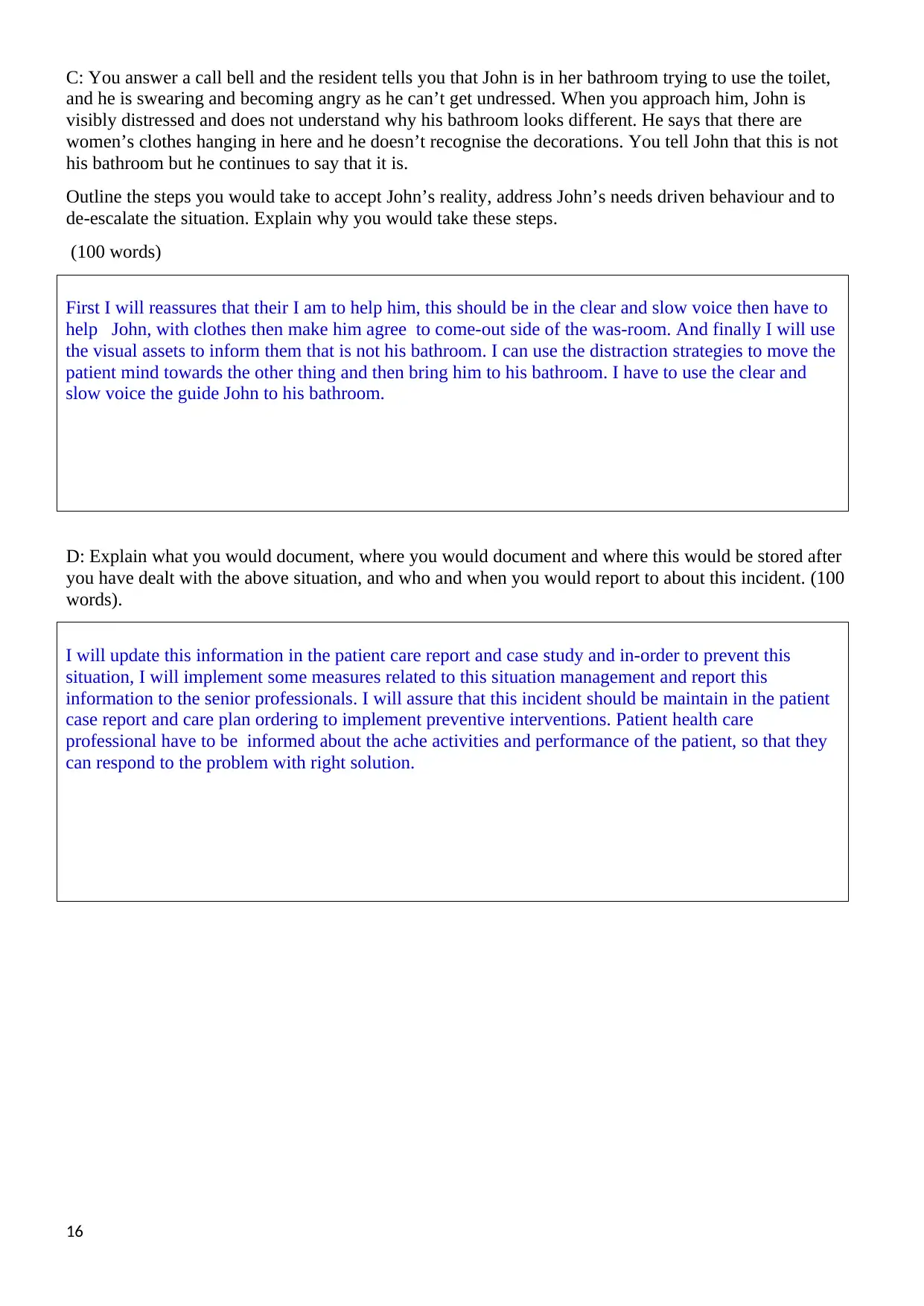
C: You answer a call bell and the resident tells you that John is in her bathroom trying to use the toilet,
and he is swearing and becoming angry as he can’t get undressed. When you approach him, John is
visibly distressed and does not understand why his bathroom looks different. He says that there are
women’s clothes hanging in here and he doesn’t recognise the decorations. You tell John that this is not
his bathroom but he continues to say that it is.
Outline the steps you would take to accept John’s reality, address John’s needs driven behaviour and to
de-escalate the situation. Explain why you would take these steps.
(100 words)
First I will reassures that their I am to help him, this should be in the clear and slow voice then have to
help John, with clothes then make him agree to come-out side of the was-room. And finally I will use
the visual assets to inform them that is not his bathroom. I can use the distraction strategies to move the
patient mind towards the other thing and then bring him to his bathroom. I have to use the clear and
slow voice the guide John to his bathroom.
D: Explain what you would document, where you would document and where this would be stored after
you have dealt with the above situation, and who and when you would report to about this incident. (100
words).
I will update this information in the patient care report and case study and in-order to prevent this
situation, I will implement some measures related to this situation management and report this
information to the senior professionals. I will assure that this incident should be maintain in the patient
case report and care plan ordering to implement preventive interventions. Patient health care
professional have to be informed about the ache activities and performance of the patient, so that they
can respond to the problem with right solution.
16
and he is swearing and becoming angry as he can’t get undressed. When you approach him, John is
visibly distressed and does not understand why his bathroom looks different. He says that there are
women’s clothes hanging in here and he doesn’t recognise the decorations. You tell John that this is not
his bathroom but he continues to say that it is.
Outline the steps you would take to accept John’s reality, address John’s needs driven behaviour and to
de-escalate the situation. Explain why you would take these steps.
(100 words)
First I will reassures that their I am to help him, this should be in the clear and slow voice then have to
help John, with clothes then make him agree to come-out side of the was-room. And finally I will use
the visual assets to inform them that is not his bathroom. I can use the distraction strategies to move the
patient mind towards the other thing and then bring him to his bathroom. I have to use the clear and
slow voice the guide John to his bathroom.
D: Explain what you would document, where you would document and where this would be stored after
you have dealt with the above situation, and who and when you would report to about this incident. (100
words).
I will update this information in the patient care report and case study and in-order to prevent this
situation, I will implement some measures related to this situation management and report this
information to the senior professionals. I will assure that this incident should be maintain in the patient
case report and care plan ordering to implement preventive interventions. Patient health care
professional have to be informed about the ache activities and performance of the patient, so that they
can respond to the problem with right solution.
16
Secure Best Marks with AI Grader
Need help grading? Try our AI Grader for instant feedback on your assignments.
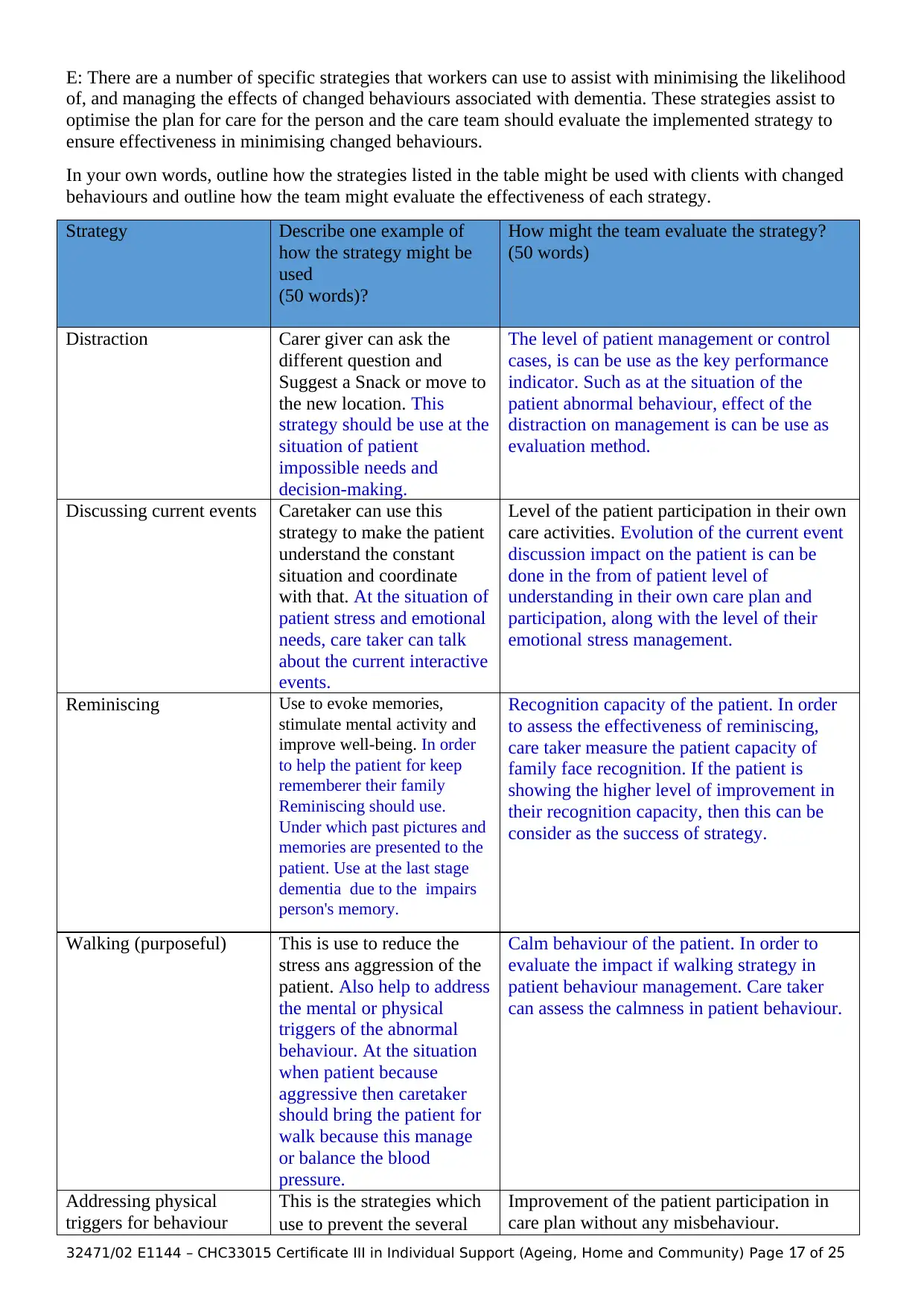
E: There are a number of specific strategies that workers can use to assist with minimising the likelihood
of, and managing the effects of changed behaviours associated with dementia. These strategies assist to
optimise the plan for care for the person and the care team should evaluate the implemented strategy to
ensure effectiveness in minimising changed behaviours.
In your own words, outline how the strategies listed in the table might be used with clients with changed
behaviours and outline how the team might evaluate the effectiveness of each strategy.
Strategy Describe one example of
how the strategy might be
used
(50 words)?
How might the team evaluate the strategy?
(50 words)
Distraction Carer giver can ask the
different question and
Suggest a Snack or move to
the new location. This
strategy should be use at the
situation of patient
impossible needs and
decision-making.
The level of patient management or control
cases, is can be use as the key performance
indicator. Such as at the situation of the
patient abnormal behaviour, effect of the
distraction on management is can be use as
evaluation method.
Discussing current events Caretaker can use this
strategy to make the patient
understand the constant
situation and coordinate
with that. At the situation of
patient stress and emotional
needs, care taker can talk
about the current interactive
events.
Level of the patient participation in their own
care activities. Evolution of the current event
discussion impact on the patient is can be
done in the from of patient level of
understanding in their own care plan and
participation, along with the level of their
emotional stress management.
Reminiscing Use to evoke memories,
stimulate mental activity and
improve well‐being. In order
to help the patient for keep
rememberer their family
Reminiscing should use.
Under which past pictures and
memories are presented to the
patient. Use at the last stage
dementia due to the impairs
person's memory.
Recognition capacity of the patient. In order
to assess the effectiveness of reminiscing,
care taker measure the patient capacity of
family face recognition. If the patient is
showing the higher level of improvement in
their recognition capacity, then this can be
consider as the success of strategy.
Walking (purposeful) This is use to reduce the
stress ans aggression of the
patient. Also help to address
the mental or physical
triggers of the abnormal
behaviour. At the situation
when patient because
aggressive then caretaker
should bring the patient for
walk because this manage
or balance the blood
pressure.
Calm behaviour of the patient. In order to
evaluate the impact if walking strategy in
patient behaviour management. Care taker
can assess the calmness in patient behaviour.
Addressing physical
triggers for behaviour
This is the strategies which
use to prevent the several
Improvement of the patient participation in
care plan without any misbehaviour.
32471/02 E1144 – CHC33015 Certificate III in Individual Support (Ageing, Home and Community) Page 17 of 25
of, and managing the effects of changed behaviours associated with dementia. These strategies assist to
optimise the plan for care for the person and the care team should evaluate the implemented strategy to
ensure effectiveness in minimising changed behaviours.
In your own words, outline how the strategies listed in the table might be used with clients with changed
behaviours and outline how the team might evaluate the effectiveness of each strategy.
Strategy Describe one example of
how the strategy might be
used
(50 words)?
How might the team evaluate the strategy?
(50 words)
Distraction Carer giver can ask the
different question and
Suggest a Snack or move to
the new location. This
strategy should be use at the
situation of patient
impossible needs and
decision-making.
The level of patient management or control
cases, is can be use as the key performance
indicator. Such as at the situation of the
patient abnormal behaviour, effect of the
distraction on management is can be use as
evaluation method.
Discussing current events Caretaker can use this
strategy to make the patient
understand the constant
situation and coordinate
with that. At the situation of
patient stress and emotional
needs, care taker can talk
about the current interactive
events.
Level of the patient participation in their own
care activities. Evolution of the current event
discussion impact on the patient is can be
done in the from of patient level of
understanding in their own care plan and
participation, along with the level of their
emotional stress management.
Reminiscing Use to evoke memories,
stimulate mental activity and
improve well‐being. In order
to help the patient for keep
rememberer their family
Reminiscing should use.
Under which past pictures and
memories are presented to the
patient. Use at the last stage
dementia due to the impairs
person's memory.
Recognition capacity of the patient. In order
to assess the effectiveness of reminiscing,
care taker measure the patient capacity of
family face recognition. If the patient is
showing the higher level of improvement in
their recognition capacity, then this can be
consider as the success of strategy.
Walking (purposeful) This is use to reduce the
stress ans aggression of the
patient. Also help to address
the mental or physical
triggers of the abnormal
behaviour. At the situation
when patient because
aggressive then caretaker
should bring the patient for
walk because this manage
or balance the blood
pressure.
Calm behaviour of the patient. In order to
evaluate the impact if walking strategy in
patient behaviour management. Care taker
can assess the calmness in patient behaviour.
Addressing physical
triggers for behaviour
This is the strategies which
use to prevent the several
Improvement of the patient participation in
care plan without any misbehaviour.
32471/02 E1144 – CHC33015 Certificate III in Individual Support (Ageing, Home and Community) Page 17 of 25
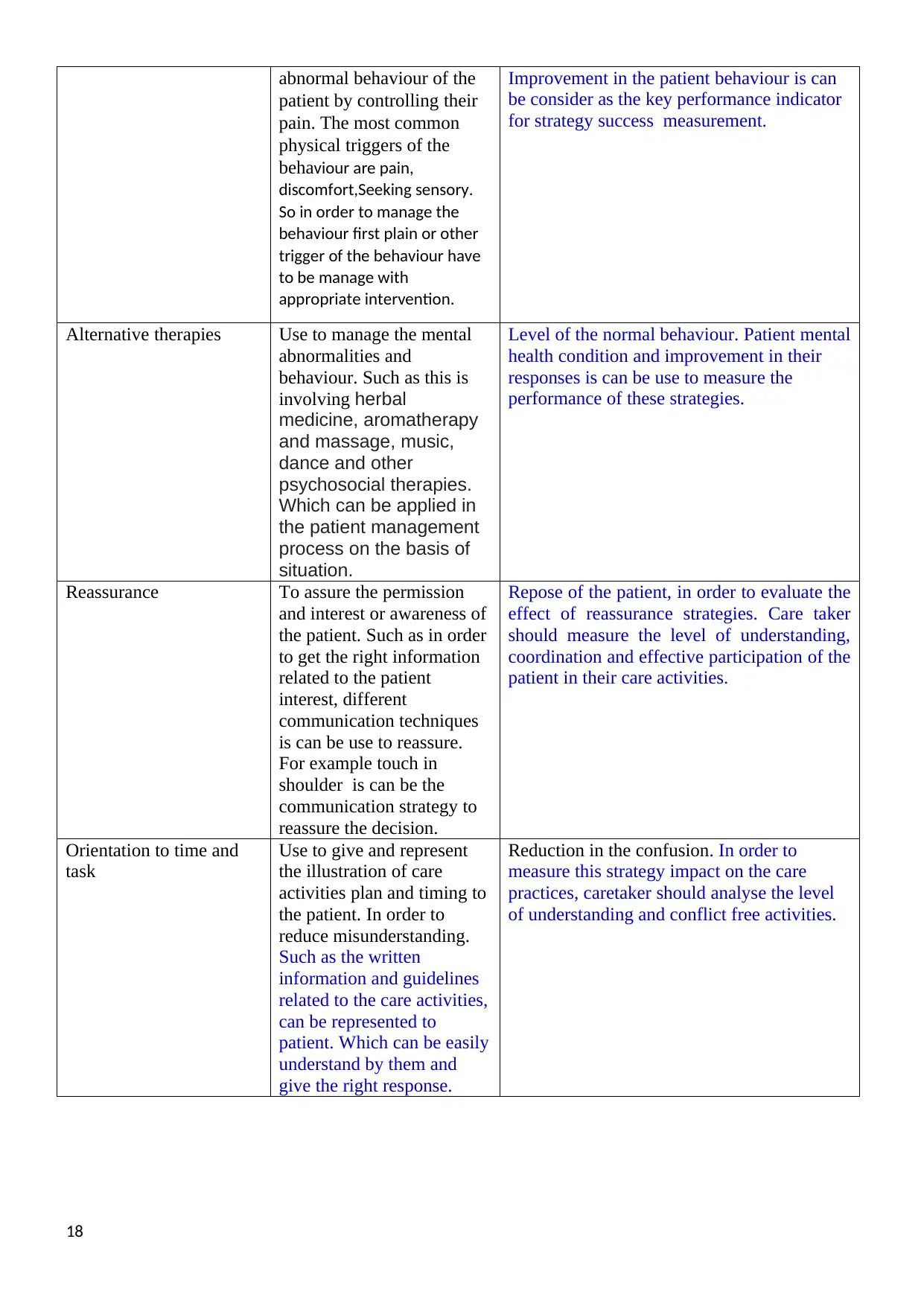
abnormal behaviour of the
patient by controlling their
pain. The most common
physical triggers of the
behaviour are pain,
discomfort,Seeking sensory.
So in order to manage the
behaviour first plain or other
trigger of the behaviour have
to be manage with
appropriate intervention.
Improvement in the patient behaviour is can
be consider as the key performance indicator
for strategy success measurement.
Alternative therapies Use to manage the mental
abnormalities and
behaviour. Such as this is
involving herbal
medicine, aromatherapy
and massage, music,
dance and other
psychosocial therapies.
Which can be applied in
the patient management
process on the basis of
situation.
Level of the normal behaviour. Patient mental
health condition and improvement in their
responses is can be use to measure the
performance of these strategies.
Reassurance To assure the permission
and interest or awareness of
the patient. Such as in order
to get the right information
related to the patient
interest, different
communication techniques
is can be use to reassure.
For example touch in
shoulder is can be the
communication strategy to
reassure the decision.
Repose of the patient, in order to evaluate the
effect of reassurance strategies. Care taker
should measure the level of understanding,
coordination and effective participation of the
patient in their care activities.
Orientation to time and
task
Use to give and represent
the illustration of care
activities plan and timing to
the patient. In order to
reduce misunderstanding.
Such as the written
information and guidelines
related to the care activities,
can be represented to
patient. Which can be easily
understand by them and
give the right response.
Reduction in the confusion. In order to
measure this strategy impact on the care
practices, caretaker should analyse the level
of understanding and conflict free activities.
18
patient by controlling their
pain. The most common
physical triggers of the
behaviour are pain,
discomfort,Seeking sensory.
So in order to manage the
behaviour first plain or other
trigger of the behaviour have
to be manage with
appropriate intervention.
Improvement in the patient behaviour is can
be consider as the key performance indicator
for strategy success measurement.
Alternative therapies Use to manage the mental
abnormalities and
behaviour. Such as this is
involving herbal
medicine, aromatherapy
and massage, music,
dance and other
psychosocial therapies.
Which can be applied in
the patient management
process on the basis of
situation.
Level of the normal behaviour. Patient mental
health condition and improvement in their
responses is can be use to measure the
performance of these strategies.
Reassurance To assure the permission
and interest or awareness of
the patient. Such as in order
to get the right information
related to the patient
interest, different
communication techniques
is can be use to reassure.
For example touch in
shoulder is can be the
communication strategy to
reassure the decision.
Repose of the patient, in order to evaluate the
effect of reassurance strategies. Care taker
should measure the level of understanding,
coordination and effective participation of the
patient in their care activities.
Orientation to time and
task
Use to give and represent
the illustration of care
activities plan and timing to
the patient. In order to
reduce misunderstanding.
Such as the written
information and guidelines
related to the care activities,
can be represented to
patient. Which can be easily
understand by them and
give the right response.
Reduction in the confusion. In order to
measure this strategy impact on the care
practices, caretaker should analyse the level
of understanding and conflict free activities.
18
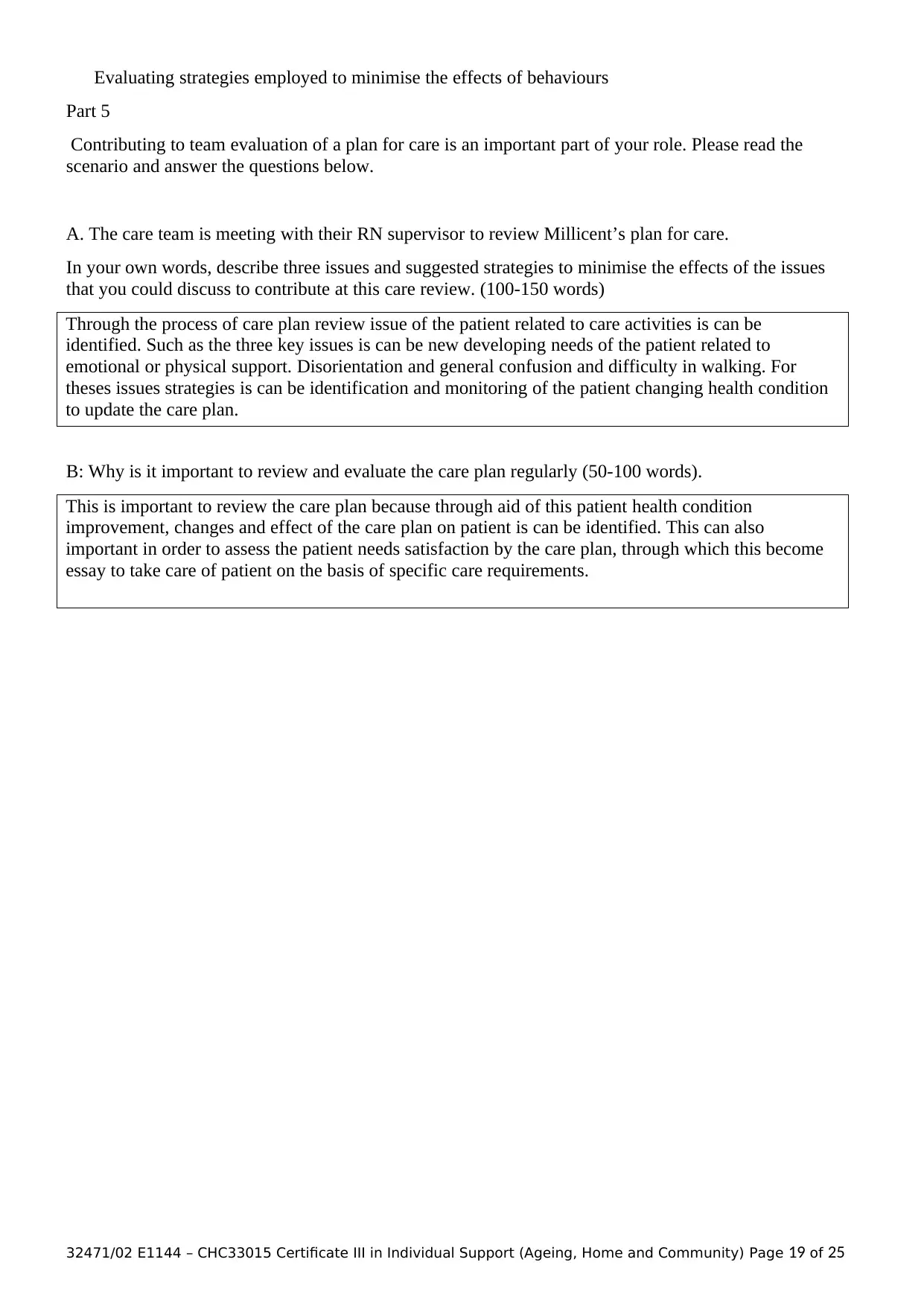
Evaluating strategies employed to minimise the effects of behaviours
Part 5
Contributing to team evaluation of a plan for care is an important part of your role. Please read the
scenario and answer the questions below.
A. The care team is meeting with their RN supervisor to review Millicent’s plan for care.
In your own words, describe three issues and suggested strategies to minimise the effects of the issues
that you could discuss to contribute at this care review. (100-150 words)
Through the process of care plan review issue of the patient related to care activities is can be
identified. Such as the three key issues is can be new developing needs of the patient related to
emotional or physical support. Disorientation and general confusion and difficulty in walking. For
theses issues strategies is can be identification and monitoring of the patient changing health condition
to update the care plan.
B: Why is it important to review and evaluate the care plan regularly (50-100 words).
This is important to review the care plan because through aid of this patient health condition
improvement, changes and effect of the care plan on patient is can be identified. This can also
important in order to assess the patient needs satisfaction by the care plan, through which this become
essay to take care of patient on the basis of specific care requirements.
32471/02 E1144 – CHC33015 Certificate III in Individual Support (Ageing, Home and Community) Page 19 of 25
Part 5
Contributing to team evaluation of a plan for care is an important part of your role. Please read the
scenario and answer the questions below.
A. The care team is meeting with their RN supervisor to review Millicent’s plan for care.
In your own words, describe three issues and suggested strategies to minimise the effects of the issues
that you could discuss to contribute at this care review. (100-150 words)
Through the process of care plan review issue of the patient related to care activities is can be
identified. Such as the three key issues is can be new developing needs of the patient related to
emotional or physical support. Disorientation and general confusion and difficulty in walking. For
theses issues strategies is can be identification and monitoring of the patient changing health condition
to update the care plan.
B: Why is it important to review and evaluate the care plan regularly (50-100 words).
This is important to review the care plan because through aid of this patient health condition
improvement, changes and effect of the care plan on patient is can be identified. This can also
important in order to assess the patient needs satisfaction by the care plan, through which this become
essay to take care of patient on the basis of specific care requirements.
32471/02 E1144 – CHC33015 Certificate III in Individual Support (Ageing, Home and Community) Page 19 of 25
Paraphrase This Document
Need a fresh take? Get an instant paraphrase of this document with our AI Paraphraser
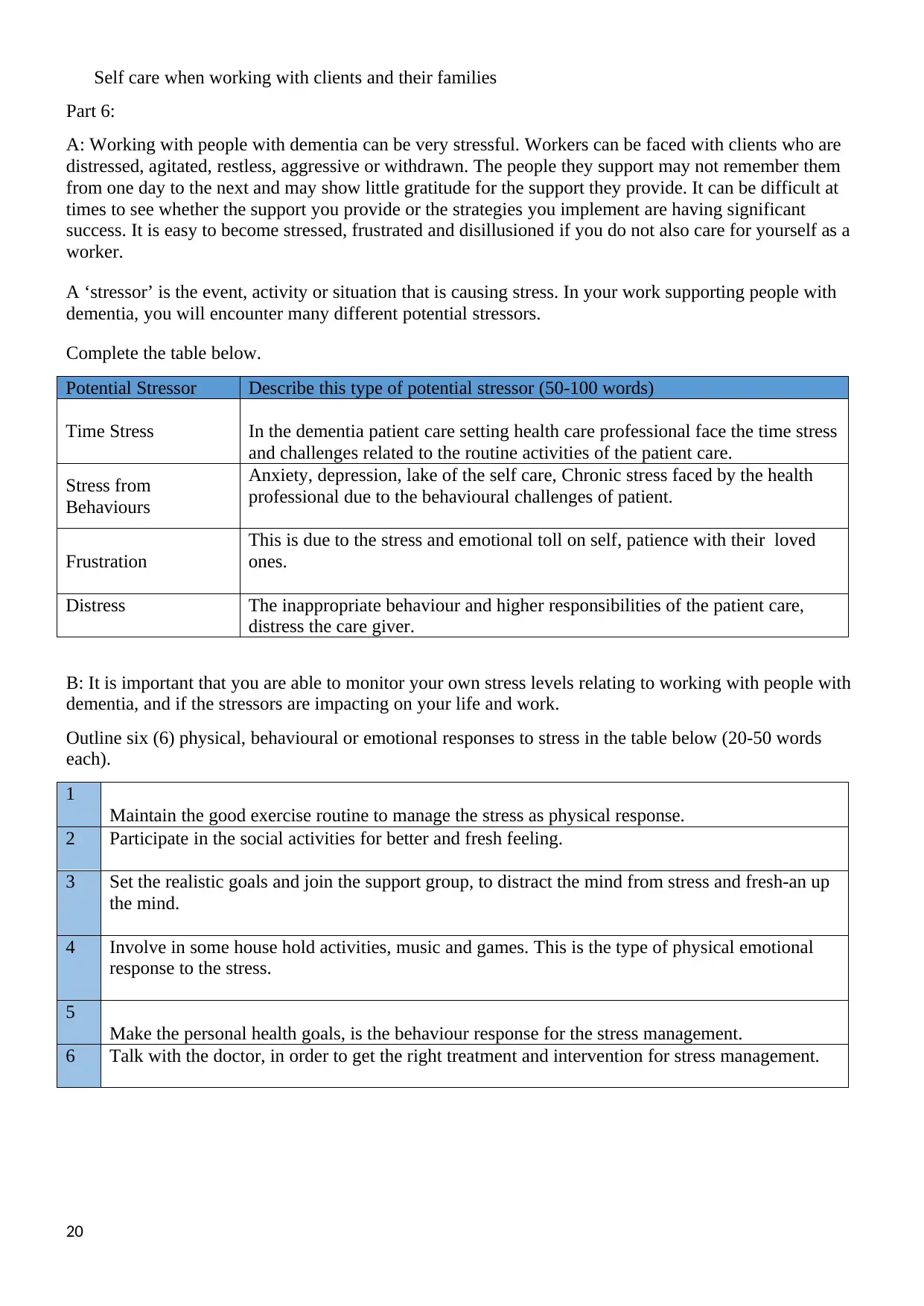
Self care when working with clients and their families
Part 6:
A: Working with people with dementia can be very stressful. Workers can be faced with clients who are
distressed, agitated, restless, aggressive or withdrawn. The people they support may not remember them
from one day to the next and may show little gratitude for the support they provide. It can be difficult at
times to see whether the support you provide or the strategies you implement are having significant
success. It is easy to become stressed, frustrated and disillusioned if you do not also care for yourself as a
worker.
A ‘stressor’ is the event, activity or situation that is causing stress. In your work supporting people with
dementia, you will encounter many different potential stressors.
Complete the table below.
Potential Stressor Describe this type of potential stressor (50-100 words)
Time Stress In the dementia patient care setting health care professional face the time stress
and challenges related to the routine activities of the patient care.
Stress from
Behaviours
Anxiety, depression, lake of the self care, Chronic stress faced by the health
professional due to the behavioural challenges of patient.
Frustration
This is due to the stress and emotional toll on self, patience with their loved
ones.
Distress The inappropriate behaviour and higher responsibilities of the patient care,
distress the care giver.
B: It is important that you are able to monitor your own stress levels relating to working with people with
dementia, and if the stressors are impacting on your life and work.
Outline six (6) physical, behavioural or emotional responses to stress in the table below (20-50 words
each).
1
Maintain the good exercise routine to manage the stress as physical response.
2 Participate in the social activities for better and fresh feeling.
3 Set the realistic goals and join the support group, to distract the mind from stress and fresh-an up
the mind.
4 Involve in some house hold activities, music and games. This is the type of physical emotional
response to the stress.
5
Make the personal health goals, is the behaviour response for the stress management.
6 Talk with the doctor, in order to get the right treatment and intervention for stress management.
20
Part 6:
A: Working with people with dementia can be very stressful. Workers can be faced with clients who are
distressed, agitated, restless, aggressive or withdrawn. The people they support may not remember them
from one day to the next and may show little gratitude for the support they provide. It can be difficult at
times to see whether the support you provide or the strategies you implement are having significant
success. It is easy to become stressed, frustrated and disillusioned if you do not also care for yourself as a
worker.
A ‘stressor’ is the event, activity or situation that is causing stress. In your work supporting people with
dementia, you will encounter many different potential stressors.
Complete the table below.
Potential Stressor Describe this type of potential stressor (50-100 words)
Time Stress In the dementia patient care setting health care professional face the time stress
and challenges related to the routine activities of the patient care.
Stress from
Behaviours
Anxiety, depression, lake of the self care, Chronic stress faced by the health
professional due to the behavioural challenges of patient.
Frustration
This is due to the stress and emotional toll on self, patience with their loved
ones.
Distress The inappropriate behaviour and higher responsibilities of the patient care,
distress the care giver.
B: It is important that you are able to monitor your own stress levels relating to working with people with
dementia, and if the stressors are impacting on your life and work.
Outline six (6) physical, behavioural or emotional responses to stress in the table below (20-50 words
each).
1
Maintain the good exercise routine to manage the stress as physical response.
2 Participate in the social activities for better and fresh feeling.
3 Set the realistic goals and join the support group, to distract the mind from stress and fresh-an up
the mind.
4 Involve in some house hold activities, music and games. This is the type of physical emotional
response to the stress.
5
Make the personal health goals, is the behaviour response for the stress management.
6 Talk with the doctor, in order to get the right treatment and intervention for stress management.
20
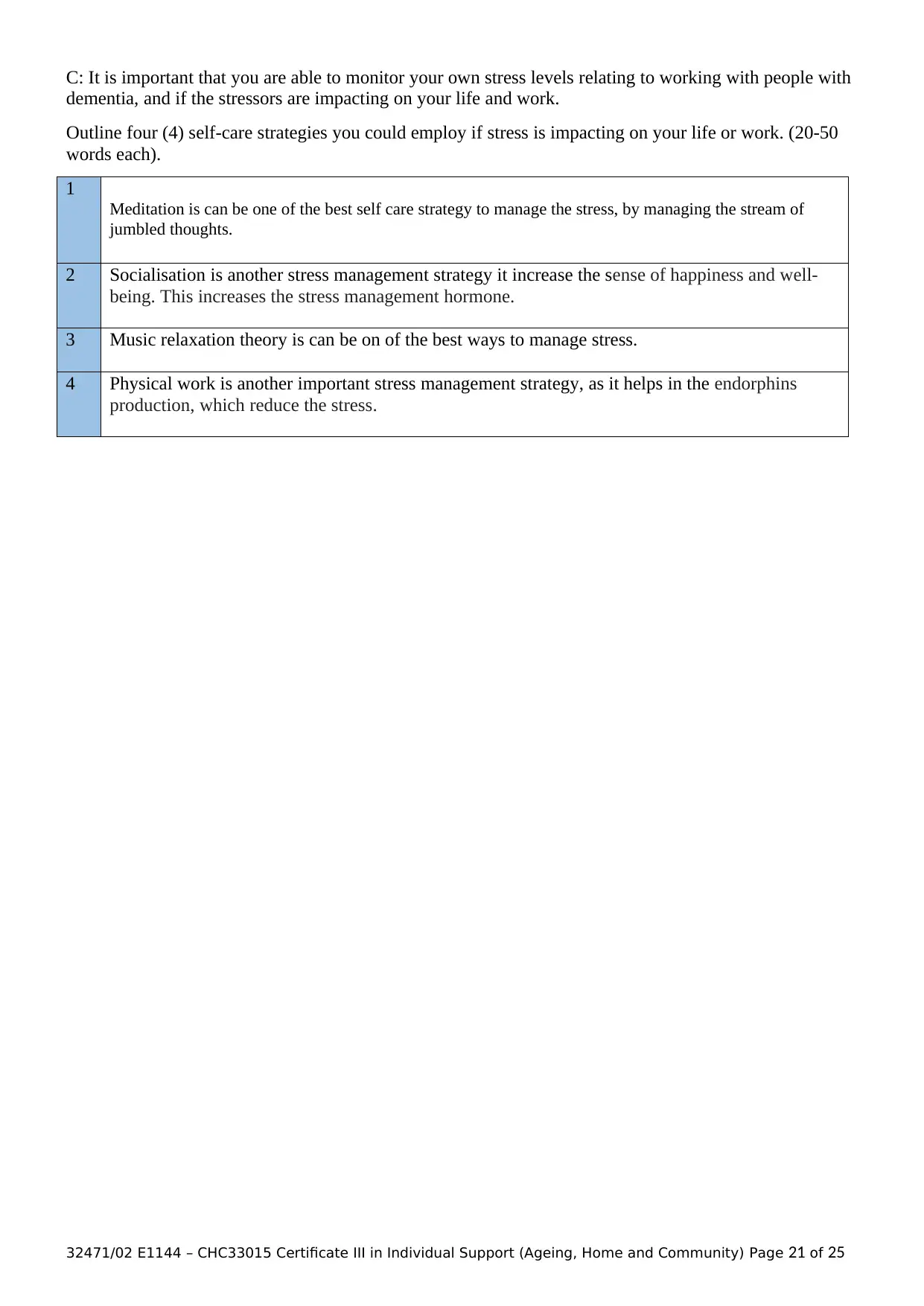
C: It is important that you are able to monitor your own stress levels relating to working with people with
dementia, and if the stressors are impacting on your life and work.
Outline four (4) self-care strategies you could employ if stress is impacting on your life or work. (20-50
words each).
1
Meditation is can be one of the best self care strategy to manage the stress, by managing the stream of
jumbled thoughts.
2 Socialisation is another stress management strategy it increase the sense of happiness and well-
being. This increases the stress management hormone.
3 Music relaxation theory is can be on of the best ways to manage stress.
4 Physical work is another important stress management strategy, as it helps in the endorphins
production, which reduce the stress.
32471/02 E1144 – CHC33015 Certificate III in Individual Support (Ageing, Home and Community) Page 21 of 25
dementia, and if the stressors are impacting on your life and work.
Outline four (4) self-care strategies you could employ if stress is impacting on your life or work. (20-50
words each).
1
Meditation is can be one of the best self care strategy to manage the stress, by managing the stream of
jumbled thoughts.
2 Socialisation is another stress management strategy it increase the sense of happiness and well-
being. This increases the stress management hormone.
3 Music relaxation theory is can be on of the best ways to manage stress.
4 Physical work is another important stress management strategy, as it helps in the endorphins
production, which reduce the stress.
32471/02 E1144 – CHC33015 Certificate III in Individual Support (Ageing, Home and Community) Page 21 of 25
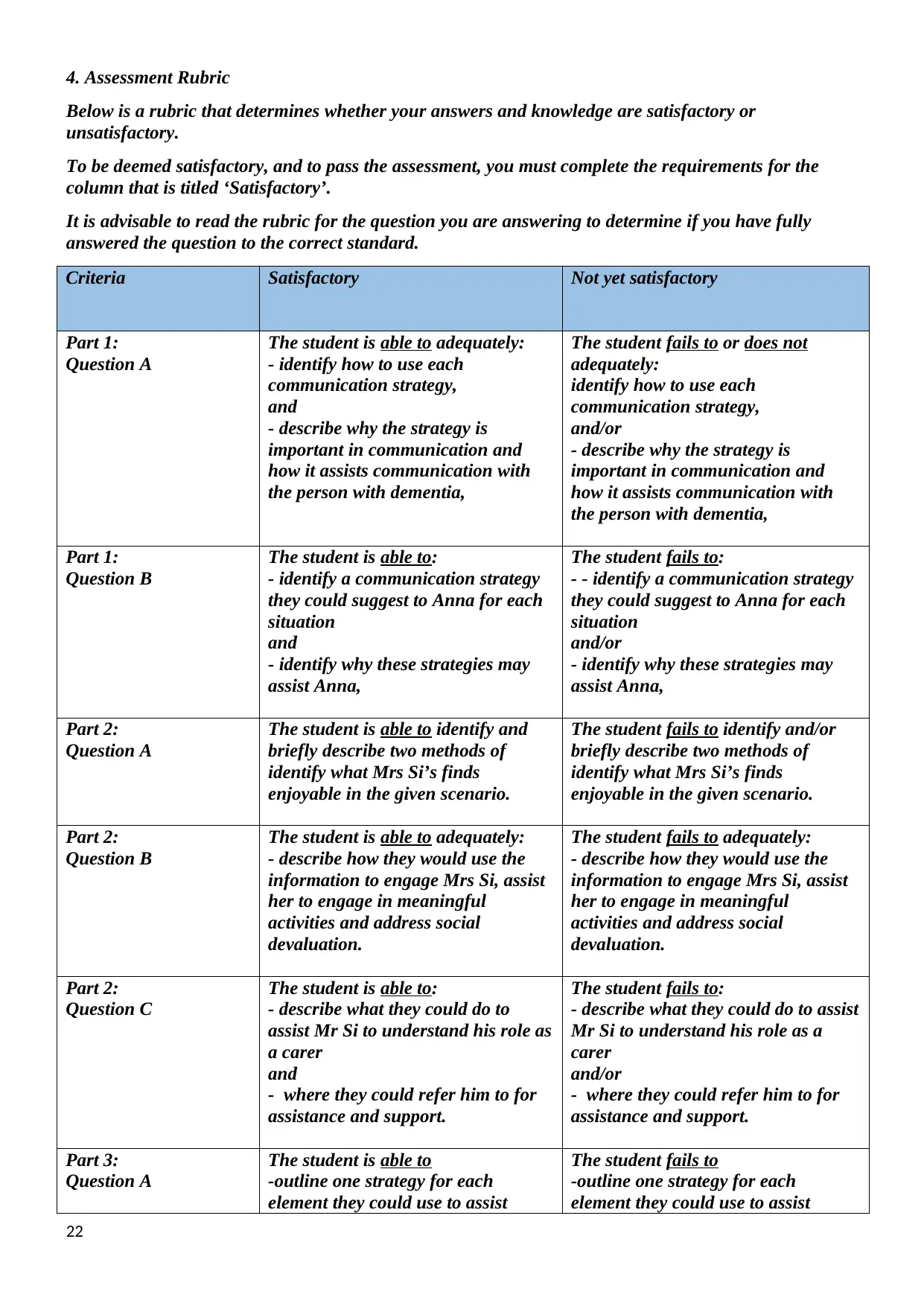
4. Assessment Rubric
Below is a rubric that determines whether your answers and knowledge are satisfactory or
unsatisfactory.
To be deemed satisfactory, and to pass the assessment, you must complete the requirements for the
column that is titled ‘Satisfactory’.
It is advisable to read the rubric for the question you are answering to determine if you have fully
answered the question to the correct standard.
Criteria Satisfactory Not yet satisfactory
Part 1:
Question A
The student is able to adequately:
- identify how to use each
communication strategy,
and
- describe why the strategy is
important in communication and
how it assists communication with
the person with dementia,
The student fails to or does not
adequately:
identify how to use each
communication strategy,
and/or
- describe why the strategy is
important in communication and
how it assists communication with
the person with dementia,
Part 1:
Question B
The student is able to:
- identify a communication strategy
they could suggest to Anna for each
situation
and
- identify why these strategies may
assist Anna,
The student fails to:
- - identify a communication strategy
they could suggest to Anna for each
situation
and/or
- identify why these strategies may
assist Anna,
Part 2:
Question A
The student is able to identify and
briefly describe two methods of
identify what Mrs Si’s finds
enjoyable in the given scenario.
The student fails to identify and/or
briefly describe two methods of
identify what Mrs Si’s finds
enjoyable in the given scenario.
Part 2:
Question B
The student is able to adequately:
- describe how they would use the
information to engage Mrs Si, assist
her to engage in meaningful
activities and address social
devaluation.
The student fails to adequately:
- describe how they would use the
information to engage Mrs Si, assist
her to engage in meaningful
activities and address social
devaluation.
Part 2:
Question C
The student is able to:
- describe what they could do to
assist Mr Si to understand his role as
a carer
and
- where they could refer him to for
assistance and support.
The student fails to:
- describe what they could do to assist
Mr Si to understand his role as a
carer
and/or
- where they could refer him to for
assistance and support.
Part 3:
Question A
The student is able to
-outline one strategy for each
element they could use to assist
The student fails to
-outline one strategy for each
element they could use to assist
22
Below is a rubric that determines whether your answers and knowledge are satisfactory or
unsatisfactory.
To be deemed satisfactory, and to pass the assessment, you must complete the requirements for the
column that is titled ‘Satisfactory’.
It is advisable to read the rubric for the question you are answering to determine if you have fully
answered the question to the correct standard.
Criteria Satisfactory Not yet satisfactory
Part 1:
Question A
The student is able to adequately:
- identify how to use each
communication strategy,
and
- describe why the strategy is
important in communication and
how it assists communication with
the person with dementia,
The student fails to or does not
adequately:
identify how to use each
communication strategy,
and/or
- describe why the strategy is
important in communication and
how it assists communication with
the person with dementia,
Part 1:
Question B
The student is able to:
- identify a communication strategy
they could suggest to Anna for each
situation
and
- identify why these strategies may
assist Anna,
The student fails to:
- - identify a communication strategy
they could suggest to Anna for each
situation
and/or
- identify why these strategies may
assist Anna,
Part 2:
Question A
The student is able to identify and
briefly describe two methods of
identify what Mrs Si’s finds
enjoyable in the given scenario.
The student fails to identify and/or
briefly describe two methods of
identify what Mrs Si’s finds
enjoyable in the given scenario.
Part 2:
Question B
The student is able to adequately:
- describe how they would use the
information to engage Mrs Si, assist
her to engage in meaningful
activities and address social
devaluation.
The student fails to adequately:
- describe how they would use the
information to engage Mrs Si, assist
her to engage in meaningful
activities and address social
devaluation.
Part 2:
Question C
The student is able to:
- describe what they could do to
assist Mr Si to understand his role as
a carer
and
- where they could refer him to for
assistance and support.
The student fails to:
- describe what they could do to assist
Mr Si to understand his role as a
carer
and/or
- where they could refer him to for
assistance and support.
Part 3:
Question A
The student is able to
-outline one strategy for each
element they could use to assist
The student fails to
-outline one strategy for each
element they could use to assist
22
Secure Best Marks with AI Grader
Need help grading? Try our AI Grader for instant feedback on your assignments.
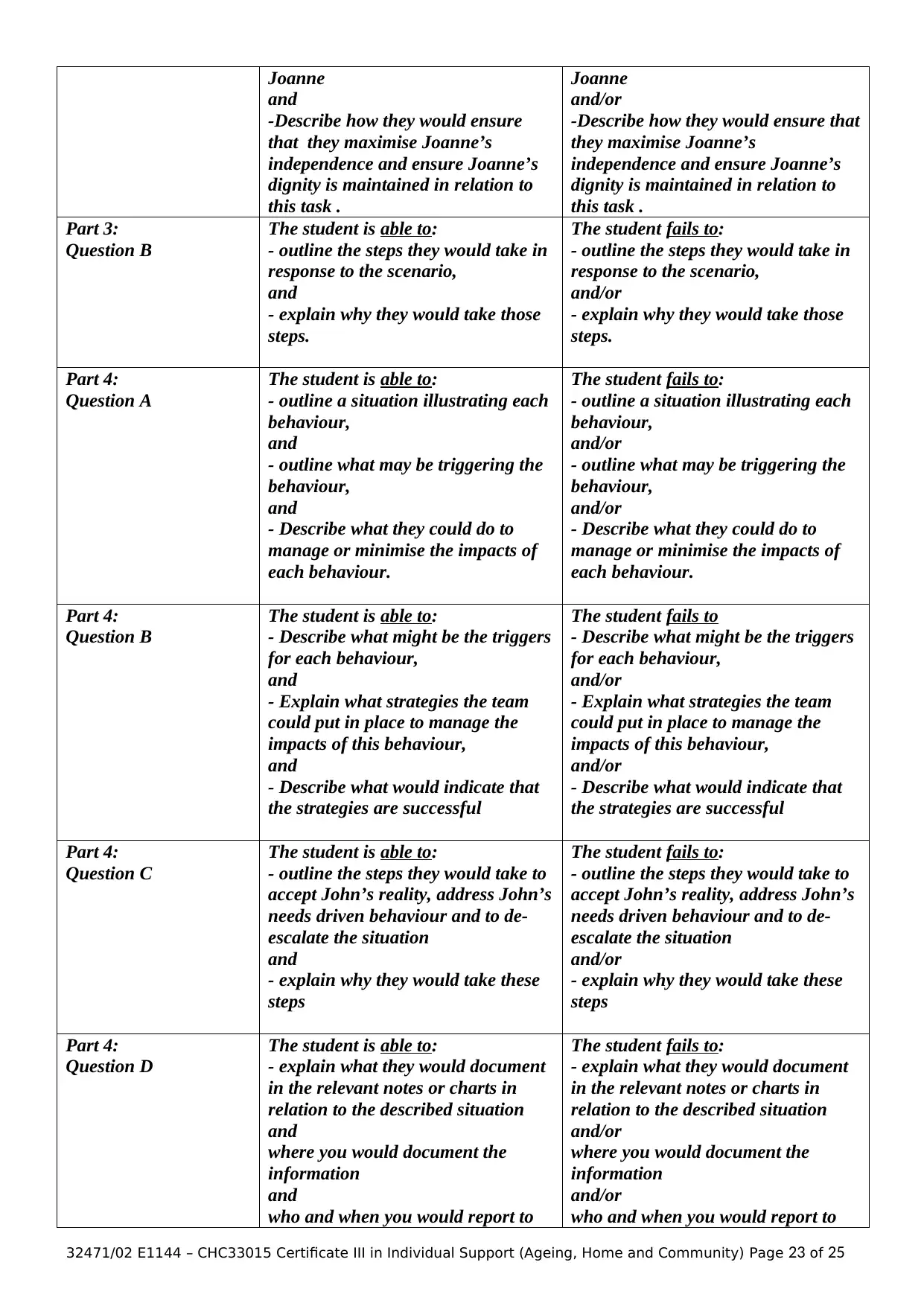
Joanne
and
-Describe how they would ensure
that they maximise Joanne’s
independence and ensure Joanne’s
dignity is maintained in relation to
this task .
Joanne
and/or
-Describe how they would ensure that
they maximise Joanne’s
independence and ensure Joanne’s
dignity is maintained in relation to
this task .
Part 3:
Question B
The student is able to:
- outline the steps they would take in
response to the scenario,
and
- explain why they would take those
steps.
The student fails to:
- outline the steps they would take in
response to the scenario,
and/or
- explain why they would take those
steps.
Part 4:
Question A
The student is able to:
- outline a situation illustrating each
behaviour,
and
- outline what may be triggering the
behaviour,
and
- Describe what they could do to
manage or minimise the impacts of
each behaviour.
The student fails to:
- outline a situation illustrating each
behaviour,
and/or
- outline what may be triggering the
behaviour,
and/or
- Describe what they could do to
manage or minimise the impacts of
each behaviour.
Part 4:
Question B
The student is able to:
- Describe what might be the triggers
for each behaviour,
and
- Explain what strategies the team
could put in place to manage the
impacts of this behaviour,
and
- Describe what would indicate that
the strategies are successful
The student fails to
- Describe what might be the triggers
for each behaviour,
and/or
- Explain what strategies the team
could put in place to manage the
impacts of this behaviour,
and/or
- Describe what would indicate that
the strategies are successful
Part 4:
Question C
The student is able to:
- outline the steps they would take to
accept John’s reality, address John’s
needs driven behaviour and to de-
escalate the situation
and
- explain why they would take these
steps
The student fails to:
- outline the steps they would take to
accept John’s reality, address John’s
needs driven behaviour and to de-
escalate the situation
and/or
- explain why they would take these
steps
Part 4:
Question D
The student is able to:
- explain what they would document
in the relevant notes or charts in
relation to the described situation
and
where you would document the
information
and
who and when you would report to
The student fails to:
- explain what they would document
in the relevant notes or charts in
relation to the described situation
and/or
where you would document the
information
and/or
who and when you would report to
32471/02 E1144 – CHC33015 Certificate III in Individual Support (Ageing, Home and Community) Page 23 of 25
and
-Describe how they would ensure
that they maximise Joanne’s
independence and ensure Joanne’s
dignity is maintained in relation to
this task .
Joanne
and/or
-Describe how they would ensure that
they maximise Joanne’s
independence and ensure Joanne’s
dignity is maintained in relation to
this task .
Part 3:
Question B
The student is able to:
- outline the steps they would take in
response to the scenario,
and
- explain why they would take those
steps.
The student fails to:
- outline the steps they would take in
response to the scenario,
and/or
- explain why they would take those
steps.
Part 4:
Question A
The student is able to:
- outline a situation illustrating each
behaviour,
and
- outline what may be triggering the
behaviour,
and
- Describe what they could do to
manage or minimise the impacts of
each behaviour.
The student fails to:
- outline a situation illustrating each
behaviour,
and/or
- outline what may be triggering the
behaviour,
and/or
- Describe what they could do to
manage or minimise the impacts of
each behaviour.
Part 4:
Question B
The student is able to:
- Describe what might be the triggers
for each behaviour,
and
- Explain what strategies the team
could put in place to manage the
impacts of this behaviour,
and
- Describe what would indicate that
the strategies are successful
The student fails to
- Describe what might be the triggers
for each behaviour,
and/or
- Explain what strategies the team
could put in place to manage the
impacts of this behaviour,
and/or
- Describe what would indicate that
the strategies are successful
Part 4:
Question C
The student is able to:
- outline the steps they would take to
accept John’s reality, address John’s
needs driven behaviour and to de-
escalate the situation
and
- explain why they would take these
steps
The student fails to:
- outline the steps they would take to
accept John’s reality, address John’s
needs driven behaviour and to de-
escalate the situation
and/or
- explain why they would take these
steps
Part 4:
Question D
The student is able to:
- explain what they would document
in the relevant notes or charts in
relation to the described situation
and
where you would document the
information
and
who and when you would report to
The student fails to:
- explain what they would document
in the relevant notes or charts in
relation to the described situation
and/or
where you would document the
information
and/or
who and when you would report to
32471/02 E1144 – CHC33015 Certificate III in Individual Support (Ageing, Home and Community) Page 23 of 25
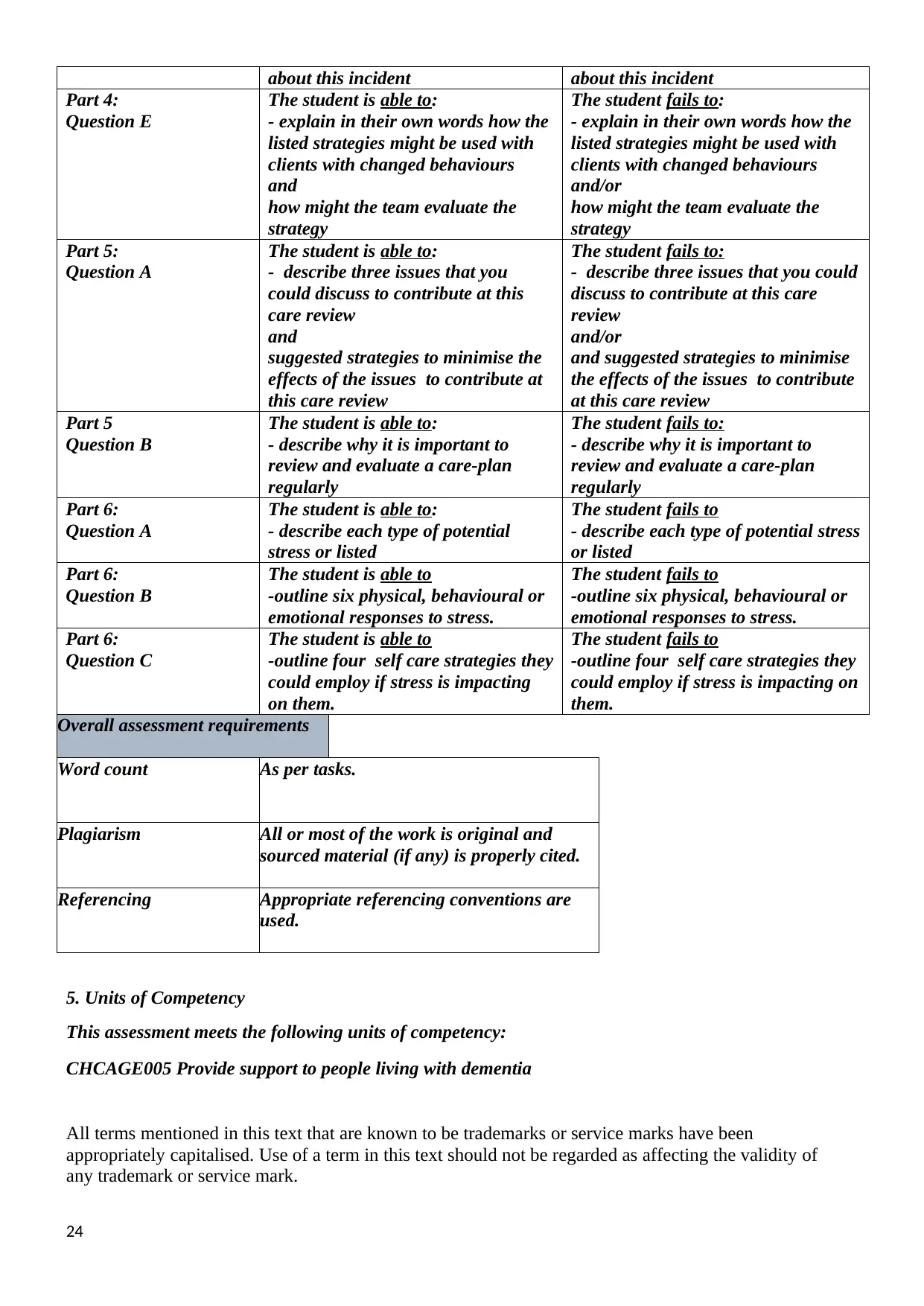
about this incident about this incident
Part 4:
Question E
The student is able to:
- explain in their own words how the
listed strategies might be used with
clients with changed behaviours
and
how might the team evaluate the
strategy
The student fails to:
- explain in their own words how the
listed strategies might be used with
clients with changed behaviours
and/or
how might the team evaluate the
strategy
Part 5:
Question A
The student is able to:
- describe three issues that you
could discuss to contribute at this
care review
and
suggested strategies to minimise the
effects of the issues to contribute at
this care review
The student fails to:
- describe three issues that you could
discuss to contribute at this care
review
and/or
and suggested strategies to minimise
the effects of the issues to contribute
at this care review
Part 5
Question B
The student is able to:
- describe why it is important to
review and evaluate a care-plan
regularly
The student fails to:
- describe why it is important to
review and evaluate a care-plan
regularly
Part 6:
Question A
The student is able to:
- describe each type of potential
stress or listed
The student fails to
- describe each type of potential stress
or listed
Part 6:
Question B
The student is able to
-outline six physical, behavioural or
emotional responses to stress.
The student fails to
-outline six physical, behavioural or
emotional responses to stress.
Part 6:
Question C
The student is able to
-outline four self care strategies they
could employ if stress is impacting
on them.
The student fails to
-outline four self care strategies they
could employ if stress is impacting on
them.
Overall assessment requirements
Word count As per tasks.
Plagiarism All or most of the work is original and
sourced material (if any) is properly cited.
Referencing Appropriate referencing conventions are
used.
5. Units of Competency
This assessment meets the following units of competency:
CHCAGE005 Provide support to people living with dementia
All terms mentioned in this text that are known to be trademarks or service marks have been
appropriately capitalised. Use of a term in this text should not be regarded as affecting the validity of
any trademark or service mark.
24
Part 4:
Question E
The student is able to:
- explain in their own words how the
listed strategies might be used with
clients with changed behaviours
and
how might the team evaluate the
strategy
The student fails to:
- explain in their own words how the
listed strategies might be used with
clients with changed behaviours
and/or
how might the team evaluate the
strategy
Part 5:
Question A
The student is able to:
- describe three issues that you
could discuss to contribute at this
care review
and
suggested strategies to minimise the
effects of the issues to contribute at
this care review
The student fails to:
- describe three issues that you could
discuss to contribute at this care
review
and/or
and suggested strategies to minimise
the effects of the issues to contribute
at this care review
Part 5
Question B
The student is able to:
- describe why it is important to
review and evaluate a care-plan
regularly
The student fails to:
- describe why it is important to
review and evaluate a care-plan
regularly
Part 6:
Question A
The student is able to:
- describe each type of potential
stress or listed
The student fails to
- describe each type of potential stress
or listed
Part 6:
Question B
The student is able to
-outline six physical, behavioural or
emotional responses to stress.
The student fails to
-outline six physical, behavioural or
emotional responses to stress.
Part 6:
Question C
The student is able to
-outline four self care strategies they
could employ if stress is impacting
on them.
The student fails to
-outline four self care strategies they
could employ if stress is impacting on
them.
Overall assessment requirements
Word count As per tasks.
Plagiarism All or most of the work is original and
sourced material (if any) is properly cited.
Referencing Appropriate referencing conventions are
used.
5. Units of Competency
This assessment meets the following units of competency:
CHCAGE005 Provide support to people living with dementia
All terms mentioned in this text that are known to be trademarks or service marks have been
appropriately capitalised. Use of a term in this text should not be regarded as affecting the validity of
any trademark or service mark.
24

© Open Colleges Pty Ltd, 2016. All rights reserved. No part of the material protected by this copyright
may be reproduced or utilised in any form or by any means, electronic or mechanical, including
photocopying, recording, or by any information storage and retrieval system, without permission in
writing from the copyright owner.
32471/02 E1144 – CHC33015 Certificate III in Individual Support (Ageing, Home and Community) Page 25 of 25
may be reproduced or utilised in any form or by any means, electronic or mechanical, including
photocopying, recording, or by any information storage and retrieval system, without permission in
writing from the copyright owner.
32471/02 E1144 – CHC33015 Certificate III in Individual Support (Ageing, Home and Community) Page 25 of 25
1 out of 25
Related Documents
Your All-in-One AI-Powered Toolkit for Academic Success.
+13062052269
info@desklib.com
Available 24*7 on WhatsApp / Email
![[object Object]](/_next/static/media/star-bottom.7253800d.svg)
Unlock your academic potential
© 2024 | Zucol Services PVT LTD | All rights reserved.





